Recent Water Damage Posts
Preventing Ice Dams
11/23/2022 (Permalink)
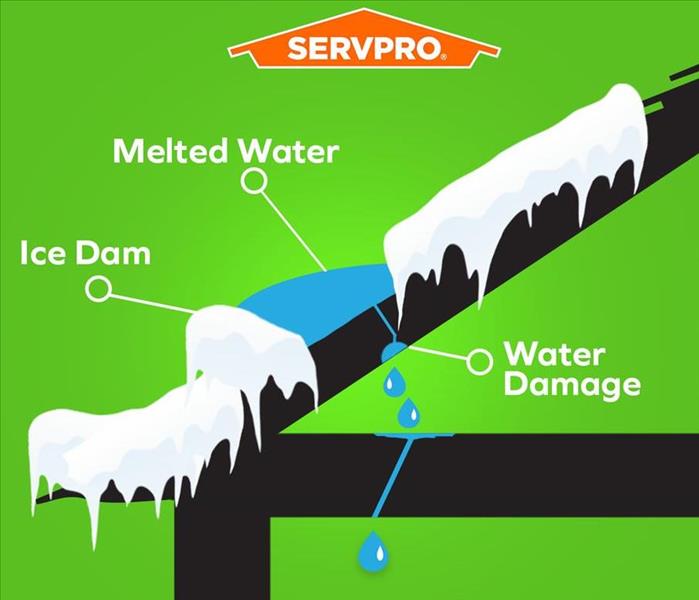 SERVPRO of Spencer & Iowa Great Lakes can make your water damage emergency "Like it never even happened." 712-262-4379
SERVPRO of Spencer & Iowa Great Lakes can make your water damage emergency "Like it never even happened." 712-262-4379
When the first few blustery days creeped into northwest Iowa, you may have been thinking about buying a new winter coat, winterizing your car, or planning your next tropical vacation. If you are like most, you probably weren’t thinking about how the coming snow could potentially cause major damage to your home. Icicles hanging along the eaves of your house may look beautiful, but they spell trouble. Snow covered roofs and freezing weather allow icicles to form and can lead to ice dams. An ice dam is a ridge of ice that forms at the edge of a roof and prevents melting snow (water) from draining off your roof. The water that backs up behind the dam can leak into your home and cause damage to walls, ceilings, insulation, and other areas. There are several signs that may indicate the presence of an ice dam. Be on the lookout for warning signs and always be sure to have excess snow cleared off your roof as soon as possible following a winter storm. Learning how to prevent ice dams on the roof is easier on you and your home than having to learn how to remove them.
What Causes Ice Dams
- Poor attic insulation
- Clogged gutters
- Lack of snow removal
Ice Dam Warning Signs
- Interior water damage
- Ice on exterior walls
- Drainage problems
- Ice forming at roof/gutter edges
- Moisture in the attic
How to Prevent Ice Dams
- Properly insulate and ventilate your attic
- Stay on top of snow removal. With no snow on your roof to melt, you eliminate a key factor of ice dams
- Metal roofing. Metal roofs boast a reputation for shedding snow exceptionally well compared to shingles
- Keep drains, scuppers, gutters, and downspouts clear of debris.
- Use a snow rake to carefully clear snow off your roof or hire a professional to do so.
- Insulate light fixtures, fans, and vents in and under attics to block heat from reaching the roof.
- Seal vents and fans between the attic and living areas to restrict warm airflow.
If neglected, ice dams can result in significant damage to your home. SERVPRO of Spencer & Iowa Great Lakes is here to help. Our highly trained staff of water loss professionals are able to help you with any damage that stems from an ice dam. We will respond quickly to help cleanup, dry, and build back your structure “Like it never even happened.”
Avoid Frozen Pipes
11/22/2022 (Permalink)
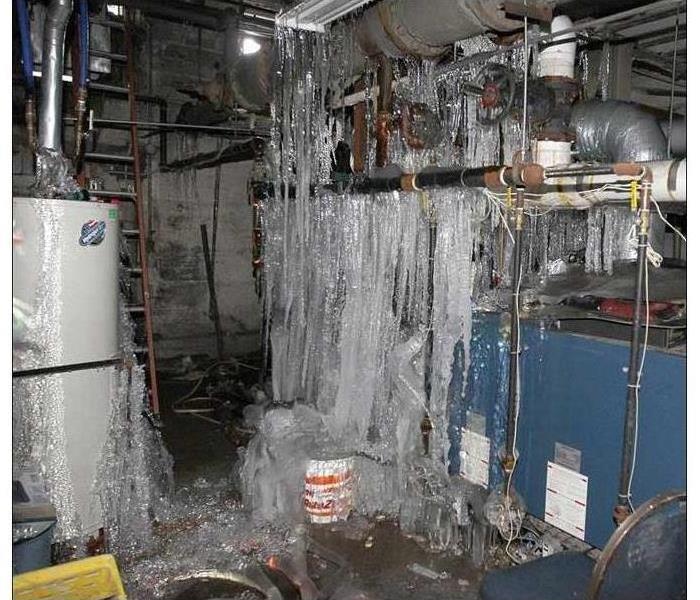 When water invades your property, call SERVPRO of Spencer & Iowa Great Lakes. 712-262-4379
When water invades your property, call SERVPRO of Spencer & Iowa Great Lakes. 712-262-4379
As winter weather enters northwest Iowa, it’s important that homeowners take steps to prevent expensive plumbing problems and water damage. Sub-zero temperatures that extend days or weeks at a time can wreak havoc on the pipes leading to and from your home or business. Even a tiny crack in a pipe can spew hundreds of gallons of water causing flooding, damage to your furnace, and serious structural damage. It also presents an immediate potential for mold. As the thermostat plunges further towards zero, the following tips will help you avoid unpleasant surprises that may come from broken water pipes.
Tips to help prevent pipes from freezing
- Insulate pipes located in the attic and crawl spaces using pipe insulation, even if the climate where you live is unlikely to have hard freeze conditions. You can also wrap pipes in heat tape or heat cables with a thermostat control. The best pipe insulation for your situation will depend on your home. Always install according to the manufacturer’s directions.
- Disconnect, drain, and store your hoses. Close any shut-off valves that supply outdoor hose bibs and open the faucet outside to drain the line. Keep it open throughout the winter to allow space for any water that remains in the pipe to expand. Consider using faucet covers throughout the colder months for extra protection against frozen pipes. Drain water from any sprinkler supply lines following the manufacturer’s directions.
- Turn up the heat. Set home thermostats above 55 degrees during cold weather.
- Open vanity and cabinet doors so warm air can reach the pipes under sinks.
- Keep the garage door closed.
- Drip cold water in the farthest faucet from your main valve. Moving water keeps pipes from freezing.
- Prevent drafts. Maintain a consistent temperature indoors by preventing drafts. Seal cracks and openings around windows and doors by using sealants or caulk.
The first step you should take if you suspect you have frozen pipes is turn off the water supply to that section of plumbing. That will relieve water pressure from your water supply lines. Call a professional plumber. Plumbers are trained, have the experience, and proper equipment to solve a frozen pipe issue. Once your plumbing issue is resolved you will need to clean up any standing water. Since a fast response to a water call lessens the damage, limits further damage, and reduces cost, call SERVPRO of Spencer & Iowa Great Lakes. Our team of professionals are here for you 24/7. We have the training and experience to restore your property quickly and properly.
Flood Cuts
9/28/2022 (Permalink)
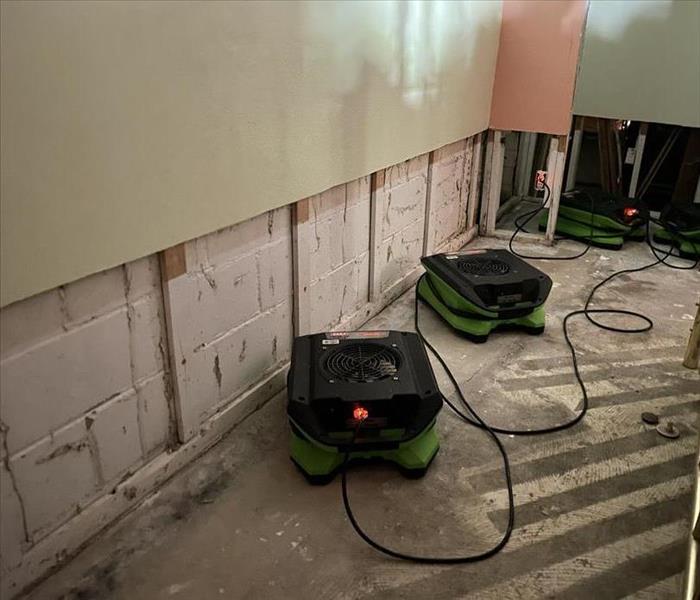 If your home or business has suffered from water damage call SERVPRO of Spencer & iowa Great Lakes 712-262-4379.
If your home or business has suffered from water damage call SERVPRO of Spencer & iowa Great Lakes 712-262-4379.
A wall that has been contaminated by sewage should not be salvaged because the materials may contain harmful pathogens or bacteria. When this happens our team of professionals will perform a flood cut.
This process involves the cutting and removal of a section of drywall. Flood cuts are approximately 12-18 inches above wherever the water touches. This will prevent any moisture behind your walls from causing mold. Once the section of drywall has been removed, it provides a better opportunity for drying out framing and other wood components that are hidden. The faster moisture can be removed the less chance for secondary damage.
SERVPRO of Spencer & Iowa Great Lakes has an on hand reconstruction crew with over 50 years of combined experience in drywall, trim/finish work, and painting to help make the process seamless.
Importance of Gutter Cleaning
9/28/2022 (Permalink)
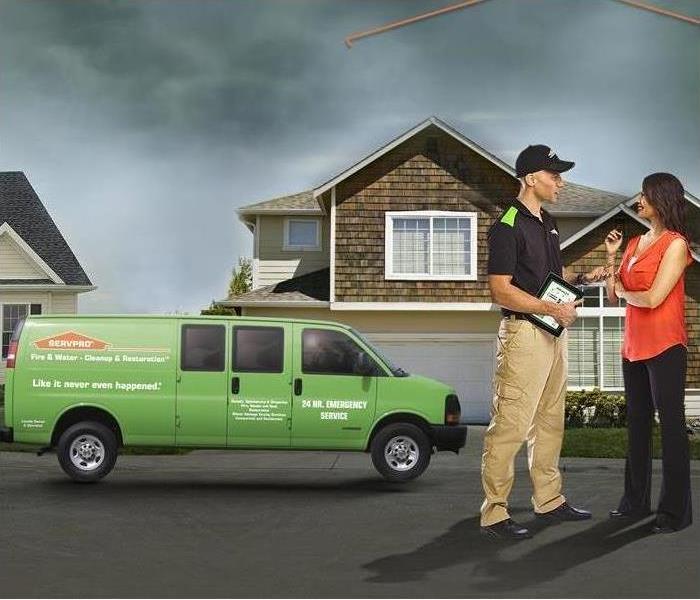 "Like it never even happened." 712-262-4379
"Like it never even happened." 712-262-4379
Cleaning out your gutters in the spring and fall isn’t just about keeping up your home’s appearance, clogged gutters can lead to major damage to your home. Clogged gutters can cause excess water to overflow and collect around the foundation of your home. Excess water can cause cracks in the foundation of your home. Damaged foundation may lead to structural damage.
If your gutters aren’t working properly your roof won’t either. Clogged gutters can lead to deteriorating shingles, rotting roof deck, wet insulation, water in your home, and damage to your ceiling and walls. It’s not just the outside of your home that’s at risk of water damage. Water can seep through to the inside of your roof. Your homes walls, doors, and window frames are not designed to withstand excess water exposure.
Leaves that clog up your gutters will begin to decompose and eventually rot. In a wet climate mold can start to grow and thrive, leaving the exterior of your gutters looking filthy. Decomposing leaves may also attract unwanted tenants like bugs, and other critters.
Whether you hire professional gutter cleaning or do it yourself, it’s important to inspect your gutters at least 1-2 times a year in the spring and fall. If you have trees close to your home that shed often you may want to check your gutters more frequently. After a severe storm has passed it’s also important to check your gutters for any leaves, branches, and debris that may have found their way to your roof.
SERVPRO of Spencer & Iowa Great Lakes specializes in the cleanup and restoration of residential and commercial property after a fire, smoke, or water damage event. We can handle any size disaster!
Check Your Sump Pump This Spring
3/30/2022 (Permalink)
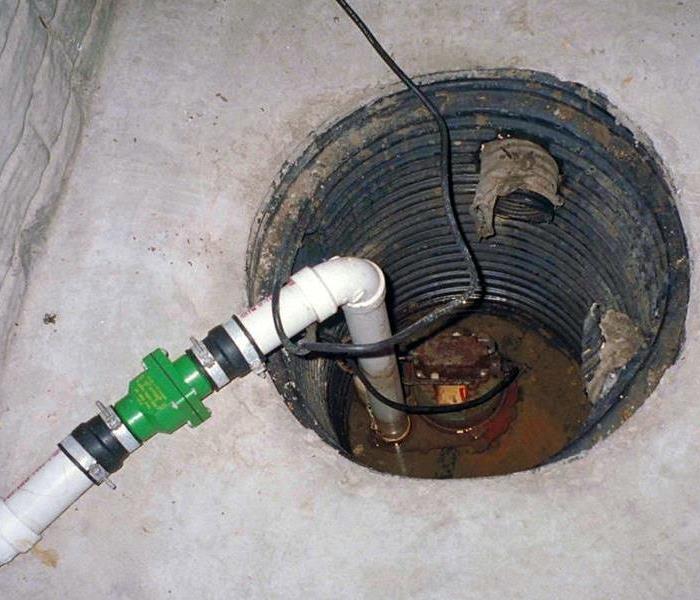 The cleanup and restoration begins with a phone call. When you are dealing with water damage, immediate action is crucial. Call 712-262-4379
The cleanup and restoration begins with a phone call. When you are dealing with water damage, immediate action is crucial. Call 712-262-4379
The sump pump is a staple in the basements of many homes around the country. They help prevent water damage due to flooding, going to work automatically as they gather excess water in the pit (the sump) and then pump it out into the wastewater system or a well.
Like your hot water heater and furnace, you should check your sump pump every 3-4 months to make sure it is in proper working order. Improperly operating sump pumps are typically the culprits for basement flooding. Luckily, testing your sump pump is easy and only takes a few minutes.
Free your exterior drain pipe of any debris
Make sure that it's still directing water away from your foundation. Remove any debris that may have gathered in or around your pump to prevent it from clogging.
Check the pumps power
Locate the two cords running to an outlet from your sump pump. One cord is the pump cord and the other float cord. The pump cord will be plugged into the back of the float cord. Unplug the two cords, and plug in the pump cord only. This should turn on the pump and you should hear the motor running. If it's working, re-connect the cords and plug them back in.
Pour water in the pump pit
If your sump pump only has one cord, you can test it by slowly pouring 5 gallons of water into the pump pit. The float should rise and the pump should then turn on. Once the water gets pumped, make sure that the pump turns itself off.
After testing your sump pump if it doesn't seem to be working properly, contact a local plumber immediately. Typically sump pumps last up to 10 years, but if it runs often, you may want to consider replacing it every 5-7 years. Sump pumps are only good in an emergency if they are in working order, so be sure to take the time and test your sump pump regularly.
If you find yourself stuck in a bad position wondering how to clean up after water damage, call the professionals at SERVPRO of Spencer & Iowa Great Lakes. We are always "Here to Help."
Protect Your Home From Sewer Backup
12/30/2021 (Permalink)
 Call the professionals at SERVPRO of Spencer & Iowa Great Lakes 712-262-4379
Call the professionals at SERVPRO of Spencer & Iowa Great Lakes 712-262-4379
Sewer backup can cause thousands of dollars in damage to floors, furniture, walls, electrical systems, and other belongings. Most homeowner and business insurance policies do not cover sewer backup unless specific sewer backup coverage is added to the policy, according to the Insurance Information Institute. Sewer backup coverage can be a highly beneficial financial protection for a home or business owner because it adds compensation for sewer backup damage.
Common Causes of Sewer Backups
Tree roots
Roots are the primary cause of a clogged sewer line, especially in older homes. Tree roots can travel far and pose risks to your home even if you don't have trees on your property. Drains located underground start to crack because as these heavy roots start to grow, they wrap around the sewer line and crush the pipes. Gurgling noises and slow-flowing drains are warning signs that tree roots are attacking your sewer system.
Old Sewer Systems
Sewer system backups can be caused from broken, collapsed, or cracked lines. Sewer pipes are usually made of PVC, cast iron, clay or Orangeburg. While these materials are durable they deteriorate over time and can cause corrosion that will eventually eat away at the pipes.
Clogged Drains
Clogs in your home's drain pipes or the city's main sewer line can cause a sewage backup, pushing waste that should flow into the public sewer system back into your home. Hair, cooking grease, or other solid materials that wastewater pipes are not meant to handle.
Why is Sewage Backup Dangerous?
Sewer backup can be a homeowner's worst nightmare and can be quite dangerous. Coming into contact with raw sewage is a threat, and it can also contaminate the air around you. Sewage backup lets off air-borne contaminants along with physical contaminants. Inhaling the vapors emitted by raw sewage can lead to gastroenteritis, which is commonly associated with fever, vomiting, cramping, and potentially death if left untreated.
Common health concern with air-borne contamination caused by sewage is asthma. As sewage releases toxins or even infected dust, the risk of breathing in the toxins is very high. Once inhaled, the toxins can attack your upper respiratory system, causing shortness of breath. These fumes are often released into the air during the cleaning process, which is why it is so important to hire a professional.
How to Prevent Sewage Backups
- Flush only toilet paper.
- Keep sewer lines clear of tree roots.
- Do not plant trees or bushes near sewer lines or laterals.
- Avoid putting fat, grease and oil down the drain.
- Line or replace old pipes.
- Install a sewer backup valve.
- Avoid connecting downspouts, French drains, sump pumps or flood control systems to the sanitary sewer line.
- Elevate the house drain.
- Hire a professional to inspect your plumbing and sewer lines.
What to Do if You Experience a Sewer Backup
Prompt cleanup of the affected property can help minimize the inconvenience and prevent mold and further damage. In the event of sewer backup, immediately arrange for the cleanup of your property. We are the water damage restoration specialists with specific training and expertise to safely restore your home or business.
Water Damage Restoration Process
12/23/2021 (Permalink)
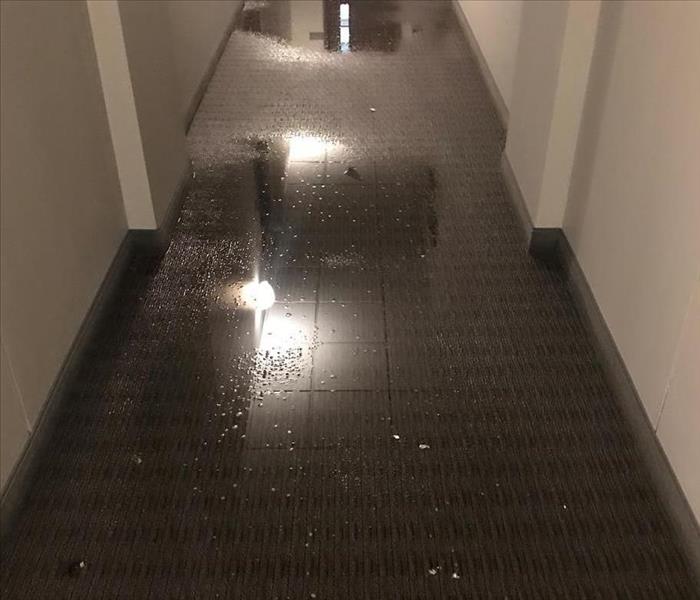 SERVPRO is a trusted leader in the Water Restoration Industry 712-262-4379
SERVPRO is a trusted leader in the Water Restoration Industry 712-262-4379
One of the most devastating things you can experience as a homeowner is severe water damage or flooding in your home. Whether it be from leaking appliances, broken pipes, or more serious issues like sewer backups, flooded basements, or water damage after a fire, they can all cause major issues. When dealing with water damage you have no time to waste as mold can start developing in as little as 24 hours. Water damage may also lead to safety hazards and structural problems that you may not notice until it's too late.
Identify the Source of Damage
If your home has suffered from water damage your first priority should be locating the source of the leak and cutting off the water supply. If you are not able to locate the source of the leak, contact a licensed professional to investigate the situation.
Contact Your Insurance
Once you have identified the source of water damage contact your insurance company, or the party responsible for building, maintaining or renovating your property. Depending on your insurance plan, you may be eligible for reimbursement for the repairs and remediation.
Call an Expert
The remediation process is critical to resolving water damage. Always use a professional restoration company. Keep receipts of damage repair, furniture, valuables, and appliances that have been damaged by the leak. You may be able to claim reimbursement for these damages down the line.
Water Damage Restoration Process
The restoration process begins when you call us. Our representative will guide you through the crisis and may ask several questions to help us better understand the equipment and resources.
We determine the scope of your water damage at this stage. We inspect and test to determine the extent of damage and how far the moisture has traveled to ensure proper and complete restoration.
The water removal process begins almost immediately and removes the majority of the water. We use powerful pumps and vacuum units to quickly remove hundreds or thousands of gallons from your property, which helps prevent secondary water damage and mold growth.
We use specialized equipment to remove the remaining water that is harder to access. Our Professionals will use room measurements, temperature, and relative humidity to determine the optimal number of air movers and dehumidifiers needed to dry your home or business.
We clean all of the restorable items and structures damaged by the water. We are adept at cleaning contents using a number of techniques. Our professionals are trained to provide sanitizing treatments and to remove odors and deodorize your property.
Restoration is the process of restoring your home or business to its pre-water damage condition. Restoration may involve minor repairs, such as replacing drywall and installing new carpet, or may entail major repairs, such as the reconstruction of various areas or rooms in a home or business.
Avoid the uncertainty of trying to repair water damage alone. Our team of professionals will get your home or business back to preloss condition, and eliminate the health and safety risks associated with do-it-yourself water damage restoration. We have the expertise and equipment to do the job quickly and efficiently.
Frozen Pipes
12/7/2021 (Permalink)
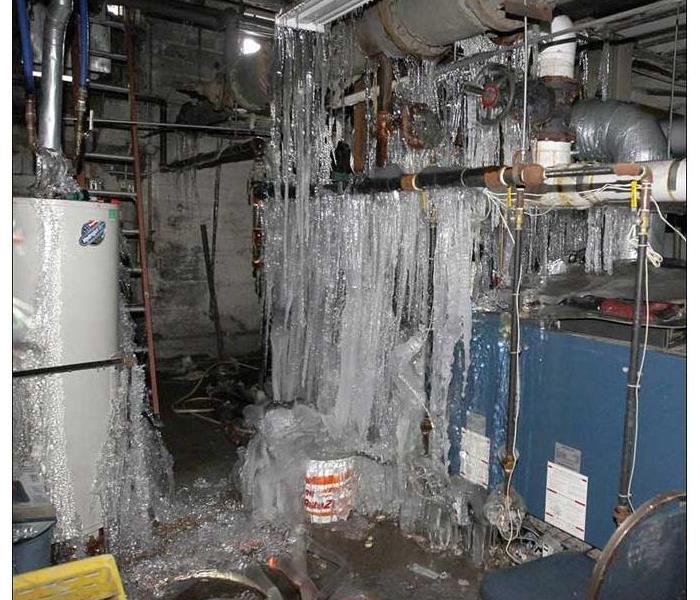 When water invades your property, timing is everything. Call SERVPRO of Spencer & Iowa Great Lakes.
When water invades your property, timing is everything. Call SERVPRO of Spencer & Iowa Great Lakes.
An all too common problem in the cold winters of Northwest Iowa is frozen pipes. Some of the most costly damage in homes is when there is a burst pipe in the upstairs and the water seeps down to the first floor and basement.
When water freezes it expands, which creates pressure on whatever is containing it. Pipes that are exposed to severe cold or located near exterior walls that have little to no insulation are more likely to freeze. Exposed pipes are generally found in unheated basements, crawl spaces, garages, attics, or kitchen cabinets. The best way to deal with freezing pipes is to prevent them in the first place.
Prevention:
- Keep water faucets running. When it is extremely cold outside, always keep one or two faucets running slowly. Water moving through the system will help prevent the line from freezing.
- Direct warm air to cold areas of your home. Often, pipes that freeze are located near an outside wall or window, so be sure to direct warm air to the colder areas of your home.
- Leave cabinet doors open. Kitchen sinks are usually on an outside wall. Be sure to leave cabinet doors open to allow warm air to into the cabinet. During cold weather it is good to leave your kitchen faucet on.
- Disconnect your hose from the outside faucet. If you leave your hose connected, water will not be able to drain out of your hose and it will freeze and break the device.
- Install heat tape. You can find heat tape at most local hardware stores. Installing heat tape will warm pipes as needed during cold weather. Consult a plumber if you have questions on installation.
- Seal any leaks that allow cold air into your home where pipes are located. Check electrical wiring, dryer vents, and pipes for air leaks. You can use caulk or insulation to keep cold air out. A tiny opening can let enough cold air in to freeze pipes during severe weather.
- Prevent the temperatures from dropping below 32 degrees in any area of your home.
- Call a licensed plumber to locate potential pipe bursts and prevent them from happening.
What to Do if a Pipe Burst:
- Turn off the main. Before anything else, make sure to turn off the water supply. Do not turn the water back on until a plumber says you are able to.
- Call a licensed plumber. Calling a plumber immediately will help minimize the damage.
- Clear away water quickly to avoid excess water damage. Water damage is inevitable when pipes burst, but the sooner you clean the water, it is less likely you will experience irreparable damage to your possessions. The longer the water stays, increases the chances of mold growth.
- Drain your faucets to remove the water left in your system. Water removal will take some pressure off your pipes and helps ensure they are dry. Flush toilets multiple time to drain the water.
- Frozen pipes must warm slowly to prevent any further damage. Turn up the heat in your home. If this isn't enough you can use a hair dryer to warm the pipes.
- To circulate warm air, keep doors open. Rooms that contain exposed pipes need more air circulation to dry the pipes and surrounding area.
For anyone experiencing water damage, call SERVPRO of Spencer & Iowa Great Lakes. Our 24-hour emergency crews will work quickly to restore your home or business. Our goal is to stop the damage from spreading because we understand that time works against a structure when water attacks. We have state-of-the-art equipment that allows us to dry the damaged area quickly and efficiently.
Ice Dams
12/3/2021 (Permalink)
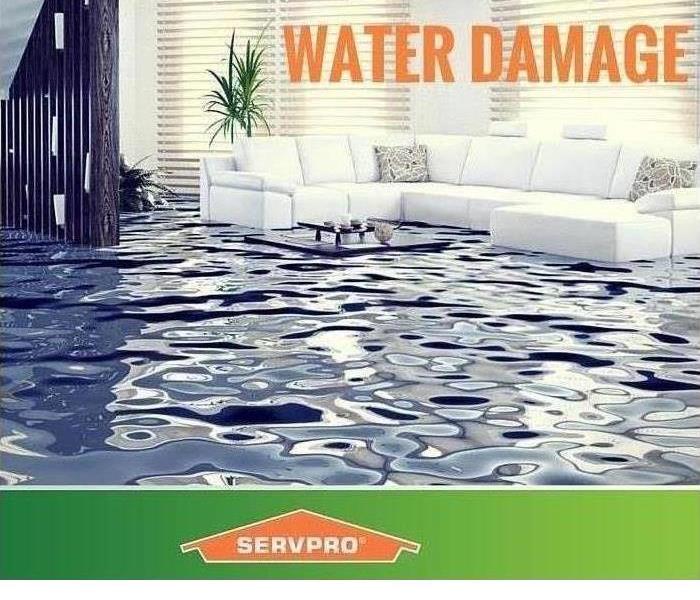 SERVPRO of Spencer & Iowa Great Lakes provides 24 hour fire and water damage restoration service.
SERVPRO of Spencer & Iowa Great Lakes provides 24 hour fire and water damage restoration service.
To homeowners in snowy, cold-winter climates, ice dams are a familiar sight. an ice dam is a mass of ice that gathers along the lower edge of a roofline where it overhangs the edge of the home. An ice dam can damage both your roof and the inside of your home, and put gutters and downspouts at risk.
How do ice dams form?
- Not enough insulation in your attic.
- Not enough ventilation in your attic
- Poorly insulated areas like outlets, light fixtures, and attic doors, that allow warm air to sneak up into your attic.
- Fluctuating temperatures
- Radiant heat from the sun.
- Perfect temperatures. When temperatures sit between 30 and 32 degrees, right at freezing or just under freezing.
Ice dams form when heat inside your home enters the attic and melts the snow. As water drips down your roof, it re-freezes as it reaches the colder eaves (the part of the roof that overhangs your wall). They develop because of the architecture of the home, ventilation, as well as insulation and heat loss that is escaping into the attic.
What kind of damage can an ice dam cause?
Ice dams can cause severe damage to your home. If left untreated, they can tear off your gutters, loosen shingles, and cause water to back up under those shingles and drain into your home. Water that cannot drain properly works its way under your roof covering and flows into the attic.
Permanent fixes for ice dams
Ventilate eaves and ridge. A ridge vent paired with continuous soffit vents circulates cold air under the entire roof. Both ridge and soffit vents should have the same size openings and provide at least 1 square foot of opening for every 300 square feet of attic floor. Place baffles at the eaves to maintain a clear path for the airflow from the soffit vents.
Cap the hatch. An unsealed attic hatch or whole-house fan is a massive opening for heat to escape. Cover them with weather stripped caps made from foil-faced foam board held together with aluminum tape.
Exhaust to the outside. Make sure that the ducts connected to the kitchen, bathroom, and dryer vents all lead outdoors through either the roof or walls, but never through the soffit.
Add insulation. More insulation on the attic floor keeps the heat where it belongs. To find how much insulation your attic needs, check with your local building department.
Install sealed can lights. Old-style recessed lights give off great plumes of heat and can’t be insulated without creating a fire hazard. Replace them with sealed “IC” fixtures, which can be covered with insulation.
Flash around chimneys. Bridge the gap between chimney and house framing with L-shaped steel flashing held in place with unbroken beads of a fire-stop sealant. Using canned spray foam or insulation isn’t fire safe.
Seal and insulate ducts. Spread fiber-reinforced mastic on the joints of HVAC ducts and exhaust ducts. Cover them entirely with R-5 or R-6 foil-faced fiberglass.
Caulk penetrations. Seal around electrical cables and vent pipes with a fire-stop sealant. Also, look for any spots where light shines up from below or the insulation is stained black by the dirt from passing air.
Be prepared for anything this winter, and if disaster strikes call SERVPRO of Spencer & Iowa Great Lakes at (712) 262-4379.
Water Categories
10/1/2021 (Permalink)
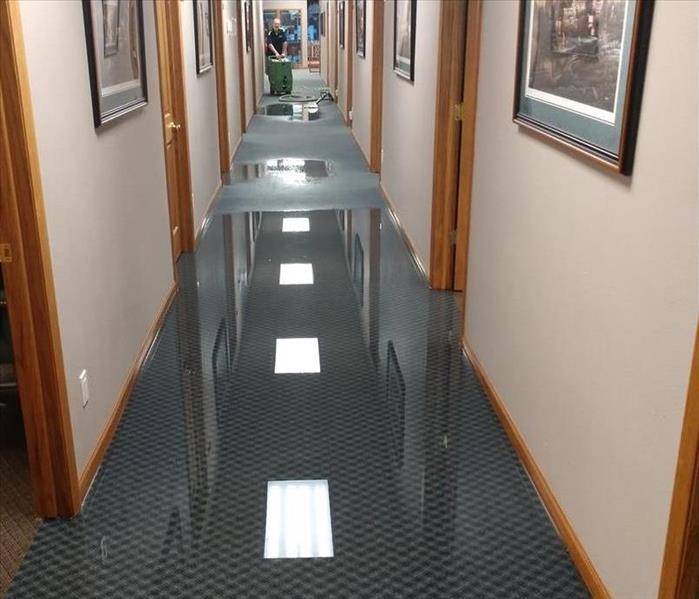 We will respond quickly to your emergency and have the expertise to handle your restoration needs no matter the size of the job.
We will respond quickly to your emergency and have the expertise to handle your restoration needs no matter the size of the job.
The different categories of water refer to the source of the water damage and other potential contaminants, including what the water may come in contact with. Water cleanliness plays a major role in the risk that the water poses to anyone or anything that it comes in contact with. If your home or business has recently suffered water damage or a water related disaster, determining the classes of water loss is an important step in beginning water damage restoration. Identifying the classes of water loss enables restoration professionals to formulate a plan of action based on your home's specific needs.
Not all water damage is created the same. While every time your property or belongings come in contact with water there is a potential risk for high costs associated to it, the cost could significantly vary depending on the category of water damage that your home or commercial property has sustained. Having an overflowing sink is not the same as having a sewage leak!
- Category 1 Water - Broken water supply lines, tub or sink overflows, or appliance malfunctions that involve water supply lines. Category 1 is from a source of water that does not pose substantial threat to humans and classified as "clean water."
- Category 2 Water - Toilet bowls with urine (no feces), sump pump failures, seepage due to hydrostatic failure, and water discharge from dishwashers or washing machines. This source is known as "grey water." Refers to a source of water that contains a significant degree of chemical, biological or physical contaminants and causes discomfort or sickness when consumed or even exposed to. This type carries microorganisms and nutrients of micro-organisms.
- Category 3 Water - This category includes water sources from sewage, seawater, rising water from rivers or streams, ground surface water, or standing water. Category 2 Water or Grey Water that is not promptly removed from the structure and or have remained stagnant may be re classified as Category 3 Water. This is known as "black water" and is grossly unsanitary. This water contains unsanitary agents, harmful bacteria and fungi, causing severe discomfort or sickness. Type 3 category are contaminated water sources that affect the indoor environment.
Getting professional help immediately after the occurrence of water damage means reducing the cost of water clean-up and drying. The longer water damage sits unresolved, the worse the damage will be. SERVPRO of Spencer & Iowa Great Lakes team of professionals are available 24 hours a day 7 days a week and will respond quickly to any restoration emergency, whether it is water, fire or mold. Call our office at (712) 262-4379
Common Causes of Water Damage
10/1/2021 (Permalink)
 Call us for all of your water damage needs 712-262-4379. We are here for you 24/7
Call us for all of your water damage needs 712-262-4379. We are here for you 24/7
Life isn't possible without water, but for all of its life-giving benefits, water can also be very destructive force of nature. Several different circumstances can can be the cause for unwanted water in your home or business. From leaky pipes to faulty appliances, it is very important to recognize the potential water damage causes. According to the Insurance Information Institute each year, about one in 50 homeowners will file a water damage or freezing claim. This accounts for almost 24% of homeowners claims.
Common Causes of Water Damage
Leaking/Burst Pipes
Broken pipes are one of the leading causes of water damage in homes, and nearly every homeowner will experience a pipe burst or leak at some point. This can be caused by unregulated water pressure, temperature changes or general deterioration of old pipes. Uninsulated pipes can freeze in the winter, causing pipes to burst.
How to Avoid Burst Pipes
- Let your faucet drip.
- Direct warm air to cold areas of your home.
- Leave cabinet doors open.
- Disconnect your hose from the outside faucet.
- Make sure pipes are insulated.
- Seal leaks that allow cold air in.
- Keep interior doors open.
- Keep the garage door closed.
- Watch the thermostat
- Disconnect/Shut off water if you are going out of town.
Faulty Household Appliances
No one could argue the great benefits we get from our appliances. Appliances make things easier and more comfortable for us. Though we rely so much upon them, they can also cause havoc to our home. When appliances become faulty, serious water damage can occur. We recommend regularly checking anything that has a water source running to it.
- Dishwasher
- Washing Machine
- Refrigerator
- Hot Water Heater
Plumbing Issues
Bathroom sinks and drains can clog easily with dirt, grease, hair and other substances. Pipes break down, and structural damage is common. If clogs are not taken care of properly, health effects could occur. Clogged drains may cause damage to other areas of your home. Plumbing leaks can cause major damage to your home. A small leak hidden in the wall can slowly undermine your home or the years and promote mold and mildew growth. A large leak, on the other hand, can flood the home, destroy furniture, appliances, your most valuable belongings, and make your home temporarily uninhabitable.
Toilet Overflows
Toilet overflow is something that no one wants to think about, but when it happens it's far more than a slight inconvenience. Especially if the affected area is on an upper floor or filled with contaminated water. Contaminated water can be dangerous for you and your family's health. Even short-term exposure to the pathogens can cause health effects. Call a trusted professional that has the training and expertise to safely navigate the restoration process.
Clogged Gutters
As you tackle your spring or fall cleaning chores, be sure to add gutter cleaning to your list. This is an excellent way stay ahead of potential problems that may arise if they are clogged. Not thoroughly cleaning your gutters can cause:
- Roof Leaks
- Damage to Siding
- Gutter Damage
- Landscape Damage
- Foundation Damage
HVAC Units
Your Heating, Ventilation, and Air Conditioning (HVAC) system can cause extensive water damage if it is not maintained correctly. Common causes or HVAC water damage include:
- Clogged Drain
- Frozen Evaporator Coils
- Pipes That Are Not Connected Correctly
- Dirty Condensate Pump
- Cracked Drain Pan
- Low Refrigerant
- Condensation Buildup Within Ductwork
- Not Changing Filters Regularly
Check your HVAC system regularly to detect early signs of a leak. If you see water pooling on the floor, you know that you have a leak or clog. Follow a regular maintenance schedule to reduce your overall energy costs by 5 to 10%.
Sewage Backups
When sewer lines become obstructed, preventing wastewater from flowing through drainage pipes, blockage occurs. This "blackwater" is considered hazardous, as it contains contaminants and viruses that can present a risk of severe illness if exposed to humans or animals. Sewage backup should be addressed immediately. Knowing what causes sewer backups can help you prevent a stressful and hazardous situation in your home.
Causes for a Sewer Backup
Sewage can back up into your home when either your home's drain pipes or main sewer line becomes clogged.
Trees can grow long roots that intertwine with your sewer line. Roots can grow into a pipe and cause holes or crush the sewer line by growing around it.
Old pipes were made out of cast iron and clay piping which doesn't last long. Aging sewage systems can break down and crack, causing backups and flooded basements.
Heavy rainfall can cause sewer backups. Large amounts of rain can overwhelm your city's sewer lines. If the public sewer cannot handle excess rainfall, the water can make its way into connected sewer lines. This can put your home at risk for backflows.
How to Prevent a Sewage Backup
- Don't pour grease down the drain
- Dispose of paper products properly
- Install a new plastic pipe or cut tree roots
- Install a backwater prevention valve.
- Sewage pump maintenance
Call a professional restoration company to handle sewage backup.
Tips to Mitigate the Damage Before the Restoration Team Arrives
- Evacuate the flooded area. Sewage contaminates are hazardous to both humans and animals.
- Turn off electrical power in the flooded area.
- Do not go near electrical devices.
- Wear protective clothing.
- Shut off the valve to the main water line in your home.
- Notify your insurance company.
- Notify your sewer department.
- Do not use the water in your home until the problem is fixed.
- Open windows or doors to let fresh air flow and ventilate the area.
Always remember water from sewer system backups should be considered very dangerous. The water is grossly unsanitary and may contain bacteria and viruses that could cause serious illness. Special training and equipment is necessary to safely clean this type of contamination.
We live and work in this community too; we might even be neighbors. As a locally owned and operated business, SERVPRO of Spencer & Iowa Great Lakes is close by and ready to respond to your flood or water damage emergency. We are proud to be a active member of the Spencer community and want to do our part to make our community the best it can be.
Wait...Where's the Water?!
4/13/2021 (Permalink)
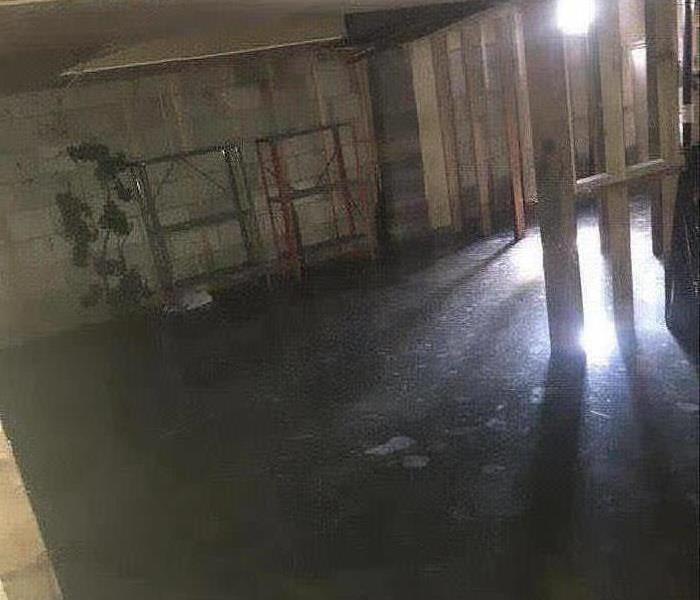 Water losses can happen at any time to anyone. Keep an eye on the maintenance of your home or business to help prevent some potential losses.
Water losses can happen at any time to anyone. Keep an eye on the maintenance of your home or business to help prevent some potential losses.
It seems crazy to think that we are only a year or so removed from non-stop water claims. We received thousands of phone calls here in NW Iowa for sump pump failures, sewer backups, water coming through foundations and even windows. Fast forward 12+ months and we are talking drought and fire warnings just after the snow melts.
Driving around all of NW Iowa and Southern Minnesota, its pretty obvious after looking at the lakes and rivers that they are suffering to start the year. That could make for a rough boating year if we don't get some more after back into these lakes.
While we are quite a ways down on the water table, that doesn't mean we should completely lower our guard to water damage. Disaster can still strike through a heavy/fast rain event, a burst water line, of even a sewer backup.
So while we wait for mother nature to bless us with more rain, take the time to be extra cautious of those things we can control such as burst water lines, water heater issues, etc.
When disaster strikes, call the team at SERVPRO of Spencer & Iowa Great Lakes. 712-262-4379
How to Prevent Your Pipes From Freezing
1/11/2021 (Permalink)
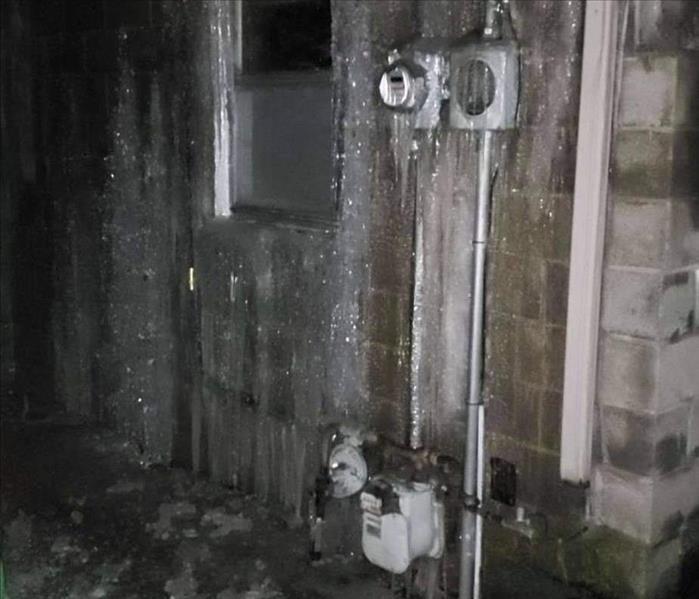 Freezing water on the side of a condo after a water pipe burst. Call SERVPRO of Spencer & Iowa Great Lakes for help with any water emergency.
Freezing water on the side of a condo after a water pipe burst. Call SERVPRO of Spencer & Iowa Great Lakes for help with any water emergency.
Winter temperatures are here, along with the risk of frozen pipes. Northwest Iowa winters can be harsh on your household plumbing. As soon as the leaves begin to fall you should start protecting your home from the cold temperatures. Follow these important steps to help prevent expensive problems later on.
*Disconnect your garden hose. This will help outside faucets and pipes from freezing, leaking or breaking.
*Close outside crawl spaces and doors to prevent cold air from seeping inside.
*Repair any broken windows, and seal all cracks in the walls.
*Wrap all water lines and meters in commercial insulation.
*Locate your shut-off valves and make sure that they are working properly.
*If you are going away, keep your thermostat at a minimum of 55 degrees fahrenheit. Have someone periodically checking on your home to ensure damage doesn’t go un-noticed.
*If you are planning on turning off your heat make sure to drain all the water from your pipes, toilets, and water heater. It may be beneficial to use antifreeze in your drains as well. Turn off the power source to the water heater. If your heater operates off of gas, turn the heater on “pilot.”
*Keep garage doors closed. A door accidentally left open leaves any water supply lines vulnerable to freezing temperatures.
*Open cabinets to keep warm air circulating around the plumbing.
*Let faucets drip, especially during bitter weather.
*Open interior doors to keep your home at a consistent temperature.
If a pipe does break make sure to turn off the main water. Open your faucets to release some of the pressure. Clean up any standing water, and call SERVPRO of Spencer & Iowa Great Lakes to prevent further damage to your home. Our team of professionals are available for 24-hour emergency service.
You Got Water - We Got You
1/3/2021 (Permalink)
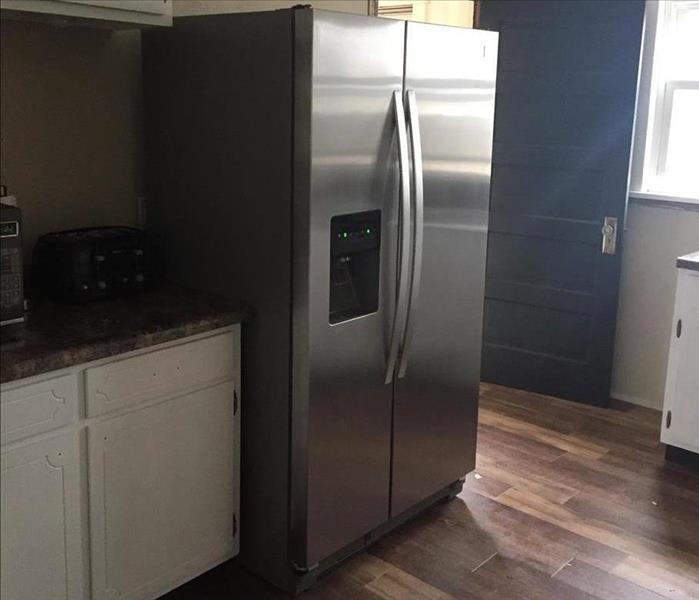 A water line leak can cause major damage to your home. Call the professionals at SERVPRO of Spencer & Iowa Great Lakes for all your water emergencies.
A water line leak can cause major damage to your home. Call the professionals at SERVPRO of Spencer & Iowa Great Lakes for all your water emergencies.
Most refrigerators are equipped with ice makers, and as homeowners, we have become accustomed to the convenience of ice available all the time. Ice makers can develop leaks that may cause damage to your home. Inspect your refrigerator for signs of leaking water under or around the base. The longer the leak has been dripping, the larger the accumulation of water will be. In cases where a drip has continued for long periods of time, you may notice damage to your baseboard. This could result in water line stains, chipped paint, mold or mildew, and swelling of the baseboards. Be sure to check the wall space behind your refrigerator for signs of water damage.
If you ever notice suddenly smaller ice cubes or ice spilling out of a full bin check your refrigerator for a malfunctioning water valve. The valve has a screen that will filter out minerals and sediments from the water supply to the ice maker. With time these screens can become blocked and prevent water from traveling freely through the line. This can result in a slow leak. Other causes for leaking ice makers include fittings for the water line, compression couplings or solenoid coil windings. Be sure to inspect your basement ceiling for any water damage that may have occurred from a slow leak in your water line.
If you notice any signs of a leaking ice maker be sure to contact a plumber asap before the problem causes extensive damage to your home. When it comes to a water emergency, you need us fast! SERVPRO offers 24-hour emergency service. We will work with your insurance company to provide a stress free claims process, and get your home back to preloss condition in no time!
Flood Cuts During Water Mitigation
12/8/2020 (Permalink)
 Flood cuts can be a necessary part of the mitigation process.
Flood cuts can be a necessary part of the mitigation process.
Water damage, if not treated quickly and efficiently, can damage flooring, walls/ceilings, and personal belongings. If proper mitigation steps aren't started within 24-48 hours, mold and mildew may begin to form. SERVPRO of Spencer & Iowa Great Lakes is here and “Ready for whatever happens.”
During the water mitigation process some homes or businesses may require a flood cut. A flood cut is the simple process of cutting out drywall that has become saturated with water. These cuts, depending on the severity of damage, may be 2-4 feet from the floor.
By removing the saturated drywall the wall cavities are able to dry properly thus preventing potential hidden mold concerns. When our team of professionals performs these cuts they will ensure the cut is strait to aid in the reconstruction process. After the cuts have been made, SERVPRO technicians will remove all debris including the drywall and any insulation that needs to be removed as part of the drying process. In many circumstances, the wall cavities and studs remaining will be treated with an antimicrobial product to help prevent mold and mildew grow.
As an added benefit, SERVPRO of Spencer & Iowa Great Lakes has an on hand reconstruction team who boasts over 50 years of combined experience in drywall, trim/finish work, and painting to help make the process seamless. Our goal is to remove as much stress from your plate as possible during this already difficult time.
SERVPRO of Spencer & Iowa Great Lakes
Making your water damaged home or business look "Like it never even happened."
712-262-4379
Winter Water Damage
12/7/2020 (Permalink)
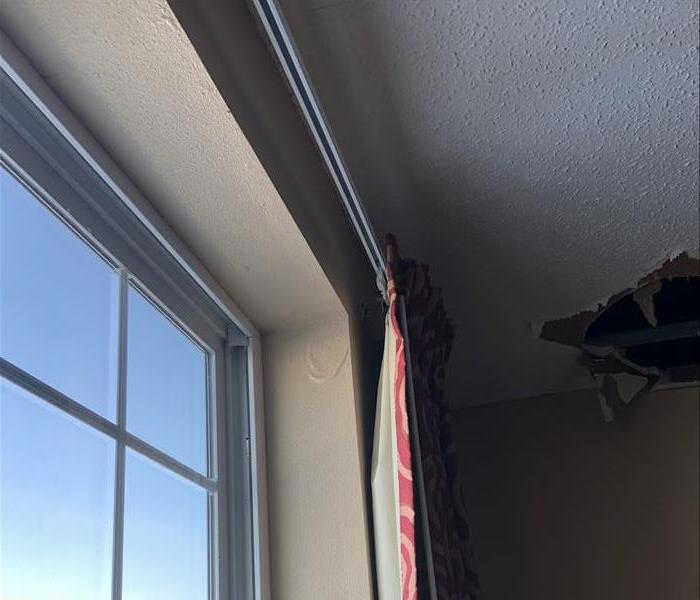 Be prepared for anything this winter, and if disaster strikes call SERVPRO of Spencer & Iowa Great Lakes at 712-262-4379.
Be prepared for anything this winter, and if disaster strikes call SERVPRO of Spencer & Iowa Great Lakes at 712-262-4379.
We are two weeks away from the official start to winter. 2020 has brought us nearly every disaster and concern we could have thought of with the exception of wet and bitterly cold conditions. While the mild weather has been much appreciated, it too can bring some winter water damage concerns.
Many of you have no doubt already taken care of prepping for winter by cleaning your gutters, unhooking the hose, and making sure the downspouts are ready for that snow melt. Here are 5 additional areas that may be cause for concern this winter season...
- Burst Pipes - While unhooking the hose helps, living in northwest Iowa we are all familiar with how bitter a north wind can be. Any waterlines or fixtures located on a north wall should be more heavily insulated to lessen the risk of pipes freezing and bursting.
- Ice Dams - These can be difficult to prevent due to the frequent melting that happens late in the afternoons. When ice dams form and are left for long periods of time the water can begin to seep into the house causing issues in your attic and wall cavities. In addition to water and mold risk, there can be damage to your roof and shingles which can drastically increase restoration costs. Check your roof regularly to ensure you do not have ice dams building throughout the winter months.
- Wind Damage - High winds are no stranger to our region. While they can cause major issues on roadways, they can also cause damage to your roof and shingles. Any roof damage throughout the course of winter, when left unattended, can cause damage for many months to come from snow melt to spring rains you may have extra moisture leaking into your attic, wall cavities, and/or ceilings. A simple roof inspection after a period of high winds can help save you thousands in the end.
- Exterior Water Lines - With much of northwest Iowa and southern Minnesota experiencing drought-like conditions we are left with dry and cracked soil in some areas. When this happens throughout the winter that increases the chance for the soil to freeze deeper than usual potentially making it to your main water lines or for some your sprinkler lines. Draining your sprinkler lines should help but if the water lines get cold enough they may crack throughout the course of the winter and causing you issues in the spring. Main water lines become an issue when your home or business has cracks in the foundation or floor allowing for the significant amounts of water that will be pushing towards your home/business to find its way inside. It is difficult to prevent an issue like this from happening, but making sure your foundation is properly tiled and free of cracks is a start. You can also have your pipes professionally inspected for any potential causes of concern.
- Leaky Appliances - Throughout the course of time our appliances get their fair share of wear and tear. Our team has responded to a number of homes who experienced a water loss due to a faulty water line to a washing machine, dishwasher, or refrigerator. We have received calls for burst water heaters and broken ice machines. It's important to inspect your appliances from time to time to ensure all water lines are still secured correctly, all hoses are draining properly and not deteriorating, and that your water heater does not have any standing water on top of or below which are signs of major issues ahead.
While many water issues in the home do have steps that can be taken to prevent potential loss, we can't plan for everything. That's why SERVPRO of Spencer & Iowa Great Lakes is Here to Help.
If disaster strikes, call the team that's Faster to Any Disaster at 712-262-4379.
Drought Conditions Cause Winter Concerns
10/13/2020 (Permalink)
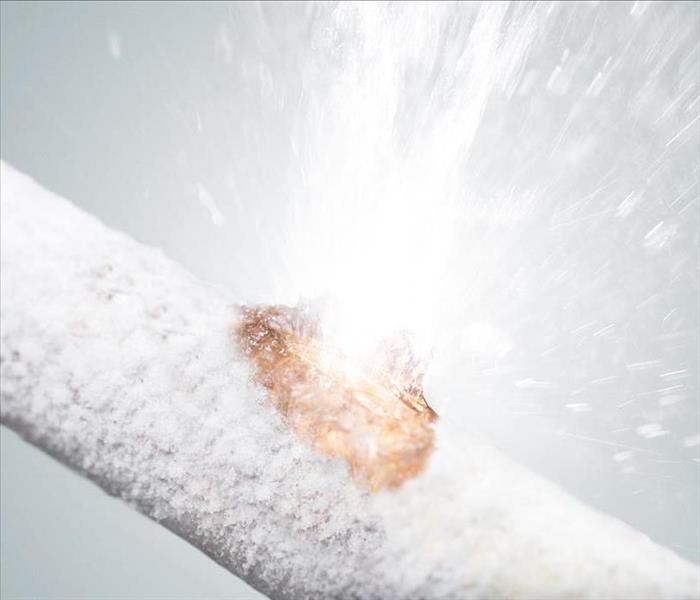 In 2020, be prepared for anything...Call SERVPRO of Spencer & Iowa Great Lakes at 712-262-4379
In 2020, be prepared for anything...Call SERVPRO of Spencer & Iowa Great Lakes at 712-262-4379
Hard to believe it wasn't long ago we were talking about flooding and how to fight off water damage, now here we are in moderate to extreme drought conditions.
These conditions lead to an early harvest for many and in some cases a poor yield. Normally this would spark a discussion for increased fire risk, which is absolutely true, but as we creep ever so close to winter we should also be concerned about the risk for additional water damage.
If we are in a drought how can we have water damage right?!
Well I will be honest, I did not realize this was an issue until I stopped into a business partner this past week and we began discussing winter. Now we all know how this goes, we hear 100 different stories on what to expect for the winter until we all give up the guessing game and just wait it out.
Our business partner and I began discussing the extreme cold that was predicted, and the concern for the frost pushing deeper into the ground than normal. When the ground freezes around the incoming water pipe that leads to a greater concern for pipes bursting before they reach the home or business. When this happens more often times than not the water will saturate the soil around the pipe and eventually find its way into the basement leading to even more damage.
In some cases as homeowners we simply can't prevent everything, but a nice layer of snow prior to deep frost will help act as insulation and heavily watering the area around those incoming pipes will cause the soil to act as an insulation barrier helping to reduce the risk.
Should you find yourself facing disaster, call the team that's always faster...SERVPRO of Spencer & Iowa Great Lakes.
712-262-4379
Large Scale Water Loss
10/2/2020 (Permalink)
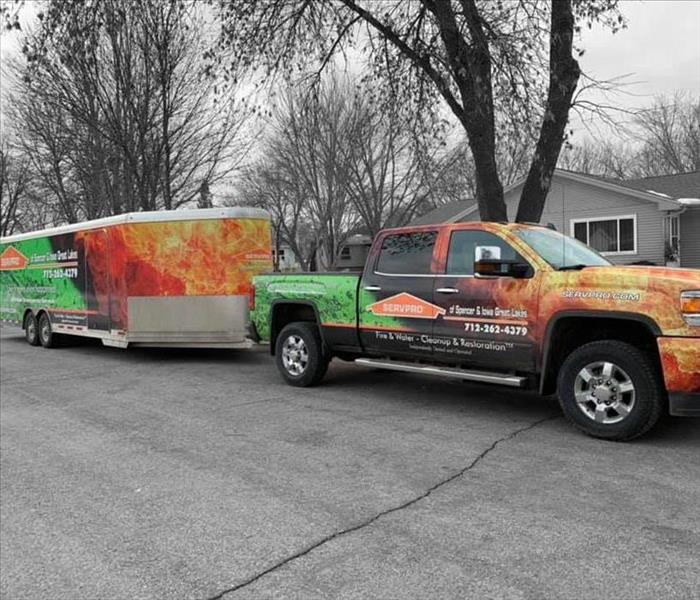 No job too large or small, we cover them all!
No job too large or small, we cover them all!
SERVPRO of Spencer & Iowa Great Lakes is a locally owned company that is part of a national network of over 1,700 Franchises. This allows us to respond faster to any disaster. We were recently called on by a neighboring franchise to help with a three story large water loss. Within hours we were able to send a team of our highly trained water restoration technicians along with a trailer of specialized equipment to assist in the restoration process. Our drying equipment ranges from air movers that speed up the drying process, dehumidifiers that work by removing excess moisture and humidity from the air, to desiccant dehumidifiers that can remove 500+ gallons of water per day.
Since a fast response to a water call lessens the damage, limits further damage, and reduces cost we offer a free service to local businesses called an emergency ready profile (ERP). A member from our marketing staff will meet with you to develop an ERP that helps you minimize business interruption by having an immediate plan of action. We just need a few minutes of your time and our staff will do the rest of the work in providing you with a paper and digital copy of all your important contact information, shut off valve locations, and priority areas of your business. If you are interested in learning more about how our ERP’s work call our office today at (712)-262-4379.
We Do Water Restoration So You Don't Have To
4/23/2020 (Permalink)
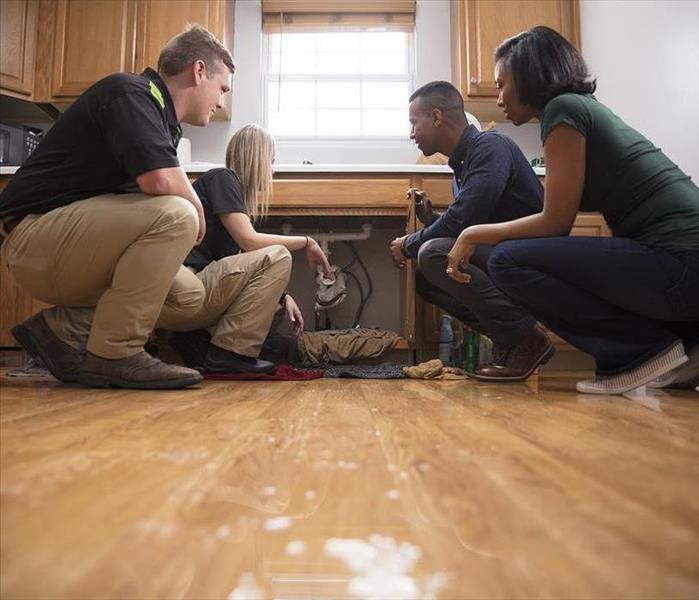 Water damage can happen to anyone at anytime. When disaster strikes call 712-262-4379.
Water damage can happen to anyone at anytime. When disaster strikes call 712-262-4379.
If your home or business has suffered a water loss it is critical that you act fast to avoid further damage. Our team of professionals at SERVPRO of Spencer & Iowa Great Lakes is here for you 24/7. We have the training and experience to restore your property quickly and properly.
Most Common Causes Of Water Loss.
*Leaking/burst Pipes
*Plumbing Issues
*Worn or Faulty Appliances
*HVAC Units
*Toilet Overflows
*Sewage Backups
*Leaky Roof
Our Water Damage Restoration Process
Although every situation is different the restoration process remains the same. At SERVPRO of Spencer & Iowa Great Lakes we are here to guide you through every step and make your home or business look “Like it never even happened.”
*Emergency Contact
*Inspection and Damage Assessment
*Water removal/Water Extraction
*Drying and Dehumidification
*Cleaning and Repair
*Restoration
We take pride in being the cleaning and restoration brand you know and trust. With over 1,700 franchises nationwide, trust the team that is truly Faster To Any Disaster. For a stress free claims process, SERVPRO works with your insurance to help manage the insurance process and paperwork. Any job large or small we are Here to Help. Call us today at 712-262-4379.
Little Water | Big Damage
2/28/2020 (Permalink)
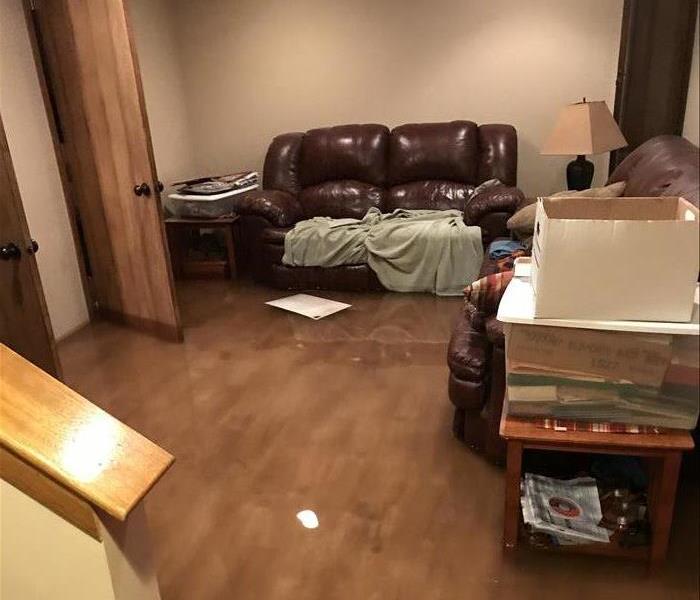 This home suffered significant water damage after last springs flooding. Our team was able to restore their home from start to finish.
This home suffered significant water damage after last springs flooding. Our team was able to restore their home from start to finish.
Any amount of unexpected water can cause a lot of damage...fast! SERVPRO of Spencer & Iowa Great Lakes receives calls from customers whom have experienced water damage in their home or business all the time. Often times we are told the water has only affected a small area, but more often than not that is not the case. With many homes and businesses using laminate, tile, or even vinyl flooring it is very easy for the water to spread under the surface and only when the pressure becomes too great will it come to the surface.
SERVPRO of Spencer & Iowa Great Lakes is equipped to handle any size job large or small. Our 24 hour on call team is ready and willing to help make your home or business "Like it never even happened." With a dedicated reconstruction team and one of the fastest response times in the region, SERVPRO has you covered.
SERVPRO of Spencer & Iowa Great Lakes specializes in the cleanup and restoration of residential and commercial property after a fire, smoke or water damage event. We can handle any size disaster!
24 Hours a Day | 7 Days a Week | 365 Days a Year
SERVPRO of Spencer & Iowa Great Lakes
712-262-4379
Clear or Contaminated...Do's and Don'ts for Your Water Restoration Needs
12/16/2019 (Permalink)
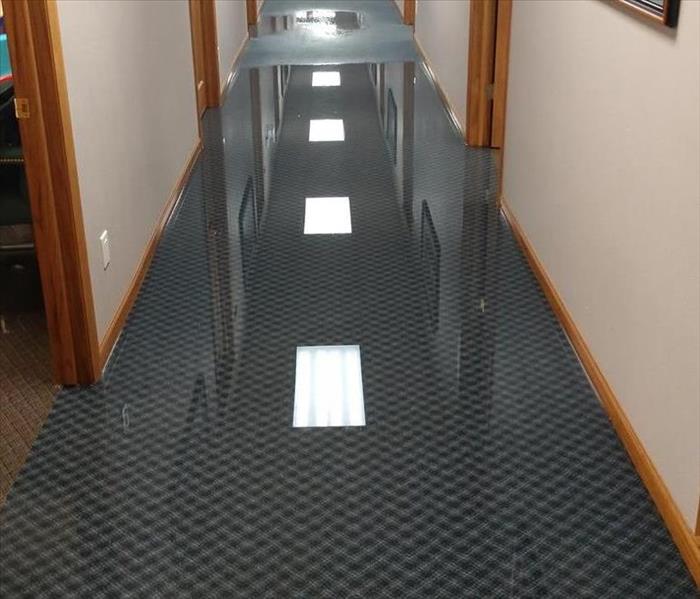 After a 2018 storm, water stood in hallways and offices of this business, our team arrived that morning to take care of the mess.
After a 2018 storm, water stood in hallways and offices of this business, our team arrived that morning to take care of the mess.
As some of you may know, there are different categories of water damage. Those range from clean water to grossly contaminated water. The cleanup methods differ in many ways in the restoration industry and to many home or business owners they don't always understand why. Here are a few tips in what to do and what not to do when working on cleaning after a water loss...
Damage from clean water
- Shut off the water source if possible or contact a qualified professional to do so.
- Turn off circuit breakers from wet areas of the building if access to the power distribution panel is safe from potential electrical shock. Do not enter rooms with standing water, as electrical shock hazards may exist.
- Remove as much excess water as possible by mopping and blotting. Wipe excess water from wood furniture after removing lamps and tabletop items.
- Remove and prop up wet upholstery cushions to allow more even drying.
- Move any paintings, art objects, computers, documents and other valuable items that may be sensitive to moisture to a safe place.
- Do not leave books, newspapers, magazines or other colored items on wet carpets or floors as they may cause staining.
- If using a vacuum to clean up water, make sure your vacuum is built to handle wet extraction.
- Do not turn on ceiling fixtures if ceiling is wet; do not enter rooms where ceilings are drooping from retained water.
Damage from contaminated water
- Avoid all contact with sewage and items contaminated by sewage. Wash your hands thoroughly if you come in contact with the contaminated water or contents within the water.
- Do not walk through contaminated areas, as you could spread damage to unaffected areas.
- Turn off the HVAC system if there is a possibility of spreading contaminated air.
- Do not use household fans to dry the structure; air flow could spread contaminants.
- Discard any food and personal hygiene products if exposed to the contaminated areas.
No matter how dirty the job, SERVPRO of Spencer & Iowa Great Lakes is here to help. As part of our duty to you, we will help break down the restoration process every step of the way for you to understand what we are doing and why.
When water damages your home or business, don’t leave your property to chance...Call SERVPRO of Spencer & Iowa Great Lakes at 712-262-4379.
The Water Restoration Process and What to Expect
12/9/2019 (Permalink)
 SERVPRO of Spencer & Iowa Great Lakes has a staff of trained restoration technicians ready to help you through your loss.
SERVPRO of Spencer & Iowa Great Lakes has a staff of trained restoration technicians ready to help you through your loss.
According to research provided by Water Damage Defense, 37% of U.S. Homeowners have suffered a water loss claim. SERVPRO of Spencer & Iowa Great Lakes has the expertise and equipment to quickly restore your home or business after a water loss using a scientific approach to water removal and restoration.
Water Damage? Call Today 712-262-4379
Every water damage event is different which means each loss will require different equipment, but the process remains the same. Read below for more understanding on the overall Water Restoration Process...
Step 1 - Emergency Contact
When you call, our representative will guide you through several questions that will help our team respond to your water emergency more quickly and efficiently. These questions allow us to bring the right equipment and the right amount of equipment to being the drying process as soon as possible preventing further damage including potential mold growth.
Step 2 - Inspection and Water Damage Assessment
Upon arrival, our technicians will inspect the area of loss using equipment such as a hygrometer and a thermal camera to see how much of the area is truly affected and to see if a cause of loss can be located. One of our technicians will also measure and map the area of loss to ensure we have adequate information for billing and to send to your insurance company if your loss is a covered claim.
Step 3 - Water Removal / Water Extraction
Once the assessment is complete our team will extract the water using our extraction equipment. In some cases there may be significant amounts of water removed from your flooring. Our team will have the necessary equipment to extract from either carpet, laminate, or hardwood flooring.
Step 4 - Drying and Dehumidification
Once the extraction is complete, our technicians will begin the drying process. They use less intrusive, scientific drying methods to draw the remaining water and moisture from your home or business with air movers and dehumidifiers. In the event of larger loss jobs, SERVPRO of Spencer & Iowa Great Lakes has access to a trailer mounted desiccant which is able to remove up to 400-500 gallons of water per day from a 50,000 sq ft area.
Step 5 - Cleaning and Sanitizing
Water damage also affects your belongings, like furniture, clothing, and personal items. SERVPRO of Spencer & Iowa Great Lakes can clean salvageable items using a number of specialized cleaning techniques. They also sanitize with antimicrobial treatments and remove odors using industrial air scrubbers, fogging equipment, and ozone machines.
Step 6 - Restoration
The last step is restoring your home or business back to its preloss condition. The restoration process can be relatively minor such as replacing drywall, or could include major reconstruction such as rebuilding entire rooms of your home or business. To help ease your stress, SERVPRO of Spencer & Iowa Great Lakes has a construction crew on staff that will put your home or business back together "Like it never even happened."
If disaster strikes your home or business call the team that is not only Faster to any Disaster, but also will make it look "Like it never even happened."
SERVPRO of Spencer & Iowa Great Lakes
712-262-4379
Lyon County Residents: We Specialize in Flooded Basement Cleanup and Restoration!
10/11/2019 (Permalink)
 This home’s basement flooded due to heavy rains.
This home’s basement flooded due to heavy rains.
A basement can flood at any time, although flooding most often occurs during heavy rainfall. Basements are inherently prone to flooding because they are the lowest level of a building and are normally built partly or entirely below ground level. There are a number of reasons why your Lyon County basement could flood, including:
- A blocked or failed sewer lateral pipe
- Heavy rain causes surface water to pool around your home
- Storm sewer backup
- Sanitary sewer backup
- Foundation drainage failure
- Water supply-line break or hot-water tank failure
- And many more
Have Questions about Basement Flooding?
Call Today - 712-262-4379
If flood water is not handled quickly and properly, it can jeopardize your health and safety, and cause severe damage to your home’s structure. Remember, the longer you wait, the worse the problem will get.
The bottom line: a flooded basement can jeopardize your health, safety, and your home’s integrity. It’s worth making a call to SERVPRO of Spencer & Iowa Great Lakes and let our trained, professional crews handle the situation safely and correctly. We have earned the trust of hundreds of homeowners, business owners, and property professionals.
We are Flooded Basement Specialists:
- We are Available 24 hours/7 days per week
- We’re a Preferred Vendor to many National Insurance Companies
- We Bill The Insurance Directly – One Less Thing For You To Worry About
- Our Technicians are Highly-Trained in Water Restoration Techniques
- We use s500 IICRC Restoration Standards
- Advanced Inspection and Extraction Equipment
Basement Flooded? Call Us Today – We’re Ready To Help 712-262-4379
Self Clean Up Leads to Huge Problems
10/4/2019 (Permalink)
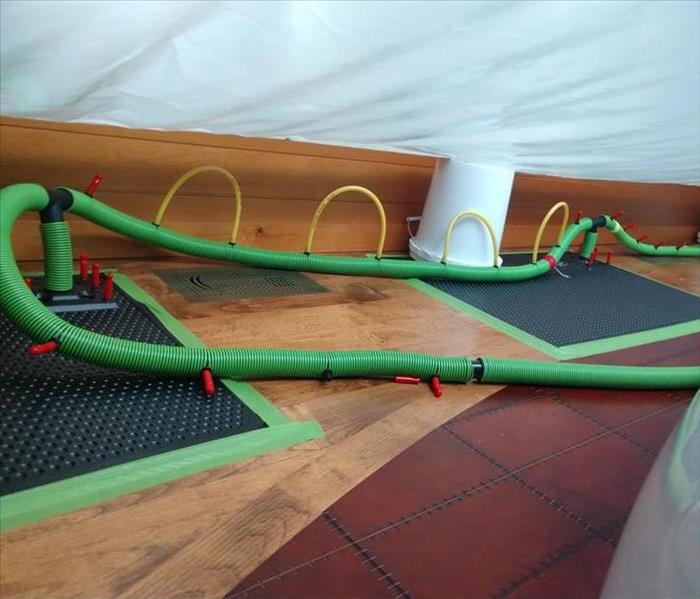 Drying equipment attempts to save flooring after a burst water line to an ice machine.
Drying equipment attempts to save flooring after a burst water line to an ice machine.
PROBLEM:
I ran into a friend of mine while out and about the other day and through our conversation he shared he walked into his house after a night out to find the hose to his refrigerator had burst and he had water everywhere.
He spent nearly 3 hours cleaning up the water and after feeling he had done an adequate job, he threw some fans on it and called it good.
Fast forward a few days and his home started to smell musty, his laminate flooring had developed a wave, and the floor joists in his basement were starting to discolor.
SOLUTION:
The quick answer is call SERVPRO of Spencer & Iowa Great Lakes. The long answer is what could have been a quick restoration process will now involve replacing the laminate flooring, potential reconstruction on drywall and trim, and mold treatment on the sub-floor & floor joists.
Sadly, what could have started as a simple 3 day drying process now leads to a week plus of restoration and reconstruction.
If you find yourself in a similar situation, no matter how tempting it is to save money, make the right choice and call the professionals at SERVPRO of Spencer & Iowa Great Lakes.
712-262-4379
My Home Has Water Damage, Now What?!
4/26/2019 (Permalink)
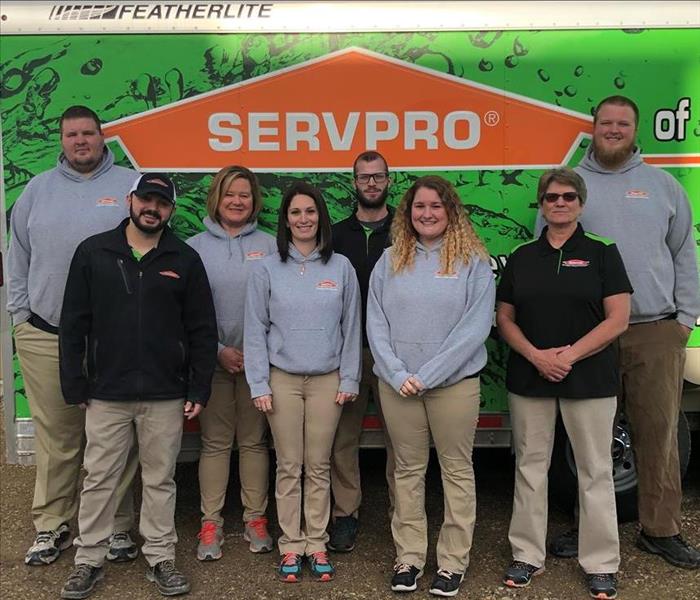 Our crew is here to help!
Our crew is here to help!
When water finds its way into your home or business there are endless amounts of questions. What do I do now? How do I get it cleaned up quickly? Should I call someone or do it myself?
The answer to all of those questions...Call SERVPRO of Spencer & Iowa Great Lakes. Our team of professionals is ready, willing, and able to help ease your anxiety and turn your home back "Like it never even happened."
From the first notice of loss to the end of the drying process, and even reconstruction if necessary. There will be a SERVPRO of Spencer & Iowa Great Lakes representative with you every step of the way. If you have questions, ask one of the representatives who is working in your home. Wondering why there is so much time between drying and reconstruction, feel free to call us. We are here to help!
Our goal is to not only minimize the interruption to your lives, but also minimize the stress and anxiety that goes along with experiencing water damage in your home or business.
Remember, if disaster strikes call the team that is here every step of the way...SERVPRO of Spencer & Iowa Great Lakes.
712-262-4379
Things to Consider When Filing an Insurance Claim
3/1/2019 (Permalink)
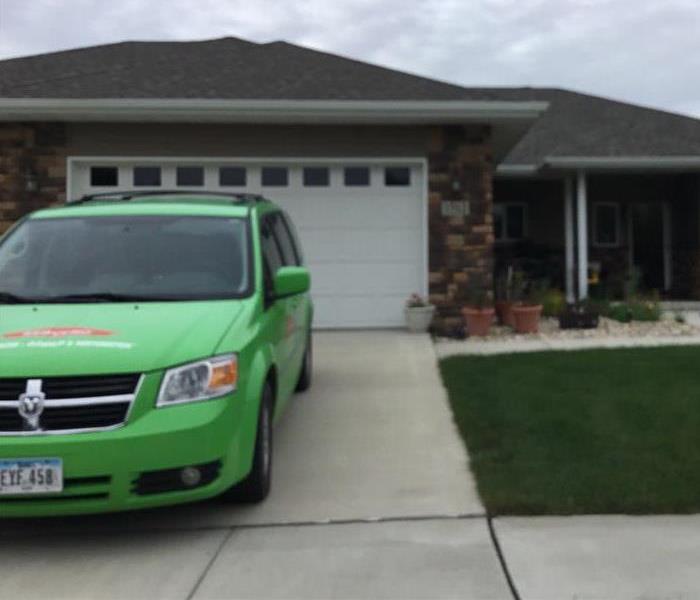 Call the team that cares about your home and your family. We work directly with your agent and adjuster to make your life easier.
Call the team that cares about your home and your family. We work directly with your agent and adjuster to make your life easier.
I had the opportunity to speak with one of our clients this past week and during our conversation we dove into the issues of when to file an insurance claim and when to consider paying out of pocket.
There are unfortunately many communities that struggle with water issues for any number of reasons. Poor drainage, built on former wetland, improper development, etc. Due to the frequent losses some homeowners use their insurance as they believe they should. The problem that arises due to frequent claims is the fact that many insurance companies begin to view that homeowner as a high risk client, the job of an insurance company is to manage risk for not only the homeowner but also for themselves. Insurance is an investment for not only the insurance company but also for the homeowner.
When the insurance company starts to see the risk level rise on the part of the homeowner, their investment in carrying the homeowners policy becomes less appealing and therefore some homeowners will be dropped by their provider. When the homeowner goes to find new insurance they will find that their claim history is unfavorable and they will end up paying higher premiums.
As a homeowner, you have ways to manage your risk as well and that begins with the decision on what to do in the event of a water loss. Many homeowners have heard that bringing in a restoration company can be expensive, in order to understand cost the homeowner must first see value. The value of using a restoration company can be the difference between a total basement renovation and a matter of a few days of drying and slight reconstruction.
The average loss will run between $3000-$5000 depending on how severe it is and what is rolled in after the drying has been done. It may seem easier to do the job yourself but the thing you need to keep in mind is that the standard dehumidifier that you purchase in store is not designed to dry behind drywall and in sill plates like more restoration companies equipment does. What this means for you, the homeowner, is that your home is dried out and treated properly rather than increasing your risk for mold and other bacteria that may linger after a water loss. In addition to mold and bacteria issues, wet materials can lead to structural issues down the road as well, so that $3000 restoration bill now becomes a $20,000 reconstruction bill which will not be covered by insurance.
When it comes to insurance and water loss, you determine if the loss is significant enough to call in a restoration company and put your long-term financial security at risk.
For questions call our team at SERVPRO of Spencer & Iowa Great Lakes at 712-262-4379.
Your 24 Hour Emergency Fire or Water Damage Service
1/15/2019 (Permalink)
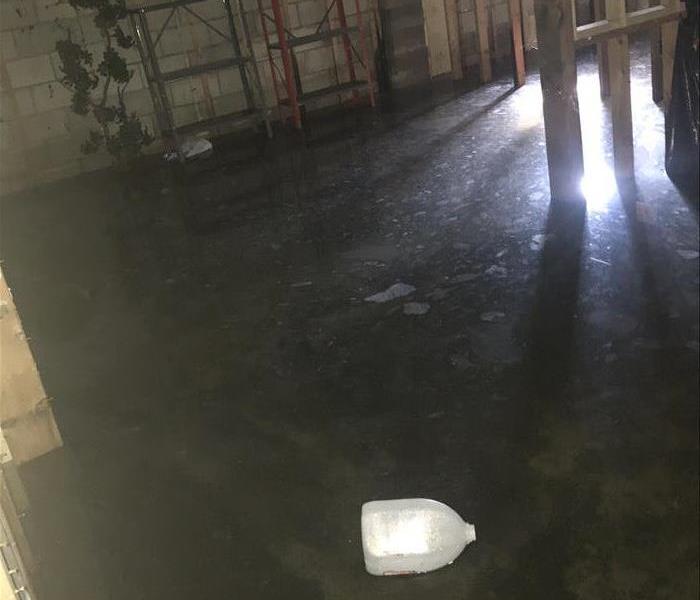 ?Call the team that can help from start to finish at SERVPRO of Spencer & Iowa Great Lakes! 712-262-4379
?Call the team that can help from start to finish at SERVPRO of Spencer & Iowa Great Lakes! 712-262-4379
SERVPRO of Spencer & Iowa Great Lakes is available 24 hours a day for water emergencies, large or small. When you are dealing with water damage, immediate action is crucial. A delay of just a few hours can greatly increase the severity of the water damage.
We Answer the Phone Ready to Help
Call Today - 712-262-4379
We understand that when you call us, you may be feeling confused, stressed, and vulnerable. You need an expert to guide you through this crisis. SERVPRO of Spencer & Iowa Great Lakes has the specific water damage training and experience to help you through this tough time. We specialize in water damage restoration—in fact, it's the cornerstone of our business.
What to Expect
When you call, we will ask several questions regarding your water damage emergency. These questions will help us determine what equipment and resources to bring, including how many trained SERVPRO Professionals may be needed.
Our SERVPRO Representative will ask several questions:
- Your name and contact information
- Your insurance information (if applicable)
- The street address of the water-damaged home or business
- When did the flooding or water damage occur?
- What caused the water damage (if known)?
- Is there electricity available (on-site)?
About SERVPRO of Spencer & Iowa Great Lakes
SERVPRO of Spencer & Iowa Great Lakes specializes in the cleanup and restoration of residential and commercial property after a fire, smoke or water damage event. Our staff is highly trained in property damage restoration. From initial and ongoing training at SERVPRO’s corporate training facility to regular IICRC-industry certification, rest assured our staff is equipped with the knowledge to restore your property.
Setting us aside from other restoration companies in the region, SERVPRO of Spencer & Iowa Great Lakes offers many additional services that help make them the right team for the job. Our crew is trained to help you from start to finish and make your home or business look "Like it never even happened."
Faster to your Water Disaster
1/7/2019 (Permalink)
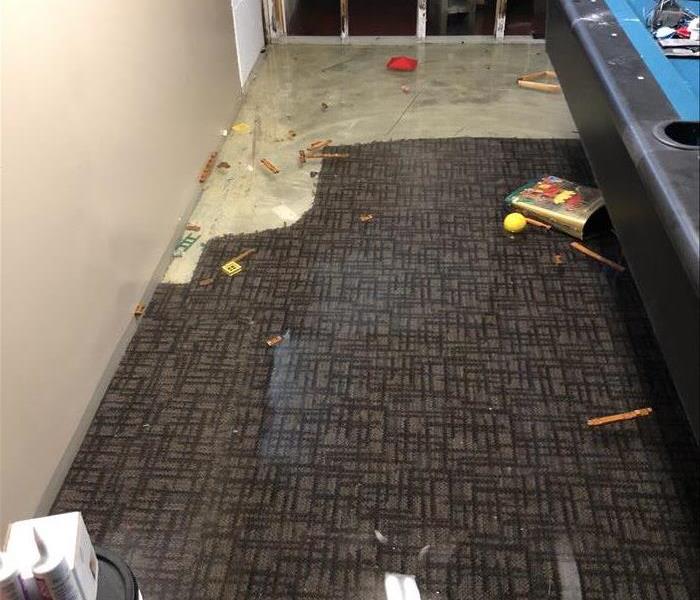 SERVPRO of Spencer & Iowa Great Lakes provides 24 hour fire and water damage restoration service.
SERVPRO of Spencer & Iowa Great Lakes provides 24 hour fire and water damage restoration service.
Flooding and water emergencies don’t wait for regular business hours and neither do we. SERVPRO of Spencer & Iowa Great Lakes provides emergency cleaning and restoration services 24 hours a day, 7 days a week—including all holidays.
Faster To Any Size Disaster
Flooding and water damage is very invasive. Water quickly spreads throughout your home and gets absorbed into floors, walls, furniture, and more. SERVPRO of Spencer & Iowa Great Lakes arrives quickly and starts the water extraction process almost immediately. This immediate response helps to minimize the damage and the cleaning and restoration costs.
Need Emergency Service? Call Us 24/7 – (712) 262 - 4379
Water Damage Timeline
Within Minutes
- Water quickly spreads throughout your property, saturating everything in its path.
- Water is absorbed into walls, floors, upholstery, and belongings.
- Furniture finishes may bleed, causing permanent staining on carpets.
- Photographs, books, and other paper goods start to swell and warp.
Hours 1 - 24:
- Drywall begins to swell and break down.
- Metal surfaces begin to tarnish.
- Furniture begins to swell and crack.
- Dyes and inks from cloth and paper goods spread and stain.
- A musty odor appears.
48 Hours to 1 Week:
- Mold and mildew may grow and spread.
- Doors, windows, and studs swell and warp.
- Metal begins to rust and corrode.
- Furniture warps and shows signs of mold.
- Paint begins to blister.
- Wood flooring swells and warps.
- Serious biohazard contamination is possible.
More Than 1 Week:
- Restoration time and cost increase dramatically; replacing contaminated materials and structural rebuilding may be extensive.
- Structural safety, mold growth, and biohazard contaminants pose serious risks to occupants.
About SERVPRO of Spencer & Iowa Great Lakes
SERVPRO of Spencer & Iowa Great Lakes specializes in the cleanup and restoration of residential and commercial property after a fire, smoke or water damage event. Our staff is highly trained in property damage restoration. From initial and ongoing training at SERVPRO’s corporate training facility to regular IICRC-industry certification, rest assured our staff is equipped with the knowledge to restore your property.
Cold Weather is Around the Corner
11/6/2018 (Permalink)
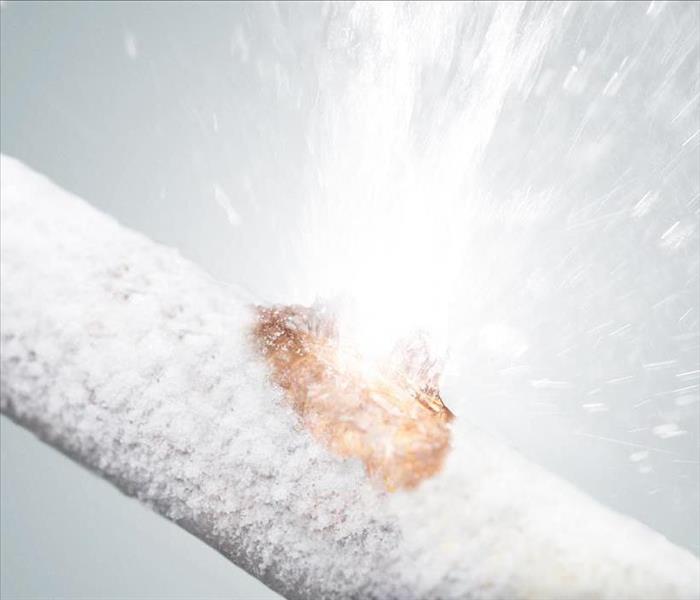 Burst pipes are the leading cause of water damage during the winter months.
Burst pipes are the leading cause of water damage during the winter months.
Seems like Mother Nature forgot summer for the most part and went right into a cool fall. Now that that nasty snow word is in the forecast it's time to start thinking about making sure your home is winter ready.
Hopefully during those few nice spells you took the time to clean out your gutters to make sure the melting snow and ice has someplace to go when it starts melting, if not then the water from the melting winter season will go to the path of least resistance which typically means up and over the side of your gutter and right into your foundation. Unless your foundation is sealed properly, that means that water will find its way into cracks in your basement walls or floors.
Due to the extremely high water table from a wet 2018, the water will still have an opportunity to find its way in much easier than it would had it been a dry year prior.
Another precaution that you can take it make sure your pipes are insulated to stave off frozen pipes. If you find yourself being away from home for a while during the winter I suggest making sure one of your faucets keeps a slow drip during your time away and having someone available to check in your house.
If disaster strikes, call the professionals at SERVPRO of Spencer & Iowa Great Lakes to make it "Like it never even happened."
712-262-4379
Protect Against Water Loss
10/4/2018 (Permalink)
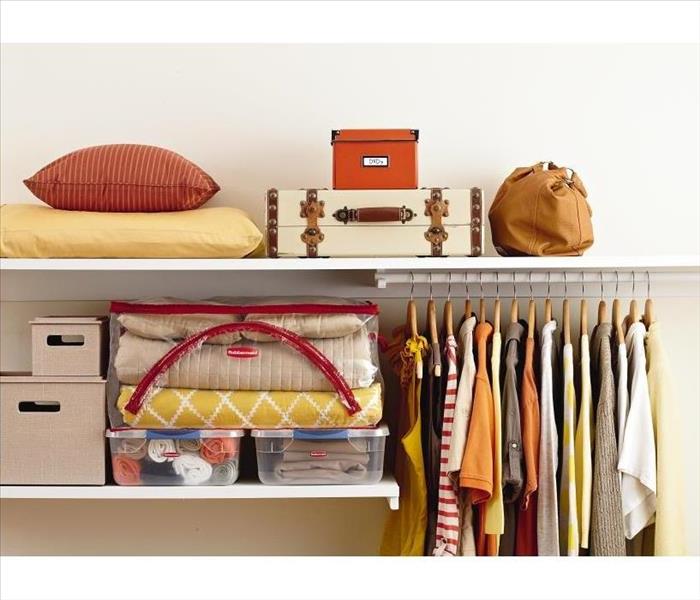 An example of a well organized closet space to help fight off water damage.
An example of a well organized closet space to help fight off water damage.
When water finds its way into your home, which in Northwest Iowa seems to be inevitable after this past summer, you want to make sure you take extra steps to make sure your belongings are protected.
Something to remember when putting items in your basement is to make sure they are at a minimum of 6" off the ground. If you place your items in cardboard boxes that will protect the bottom of the box and keep the contents inside the box dry.
Another thing you can do is use plastic totes to place your items in. They may cost more, but in the long run they offer an added level of protection that will keep your more prized possessions or cherished memories safe.
A few other things to consider when protecting against water damage...
1) Clean your Sump Pump filter at least twice per year to ensure no debris has found its way in and the pump is working properly.
2) Clean your gutters and landscaping to promote proper drainage away from the house. Too much water running directly at the foundation of the home will lead to water finding its way in through cracks in the floor or walls of your basement.
3) If possible have a backup battery for your sump pump so if there is a power outage in a storm the pump can continue to run as necessary.
Prepping for Fall/Winter
10/3/2018 (Permalink)
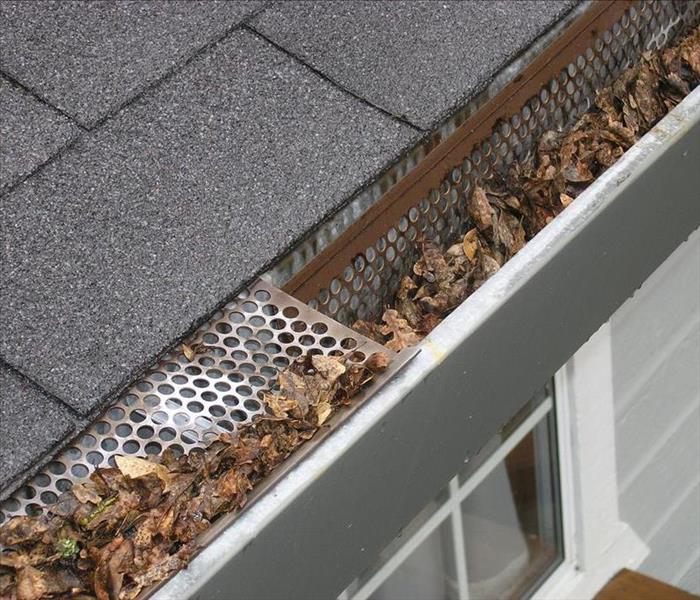 Cleaning out your gutters in the fall can prevent many issues come spring.
Cleaning out your gutters in the fall can prevent many issues come spring.
Fall is officially underway and that means leaves are falling and crisp weather.
For some homeowners they luck out and their leaves blow into their neighbors property, but for many they have to deal with the fall cleanup. While working on cleaning leaves out of the yard and landscaping, don't forget to pull the ladder out and clean the gutters to help stave off drainage issues come spring.
When gutters fill with leaves they often become impacted throughout the winter months due to snow and ice sitting on top of them. Once the warmer weather starts to roll around the homeowner can experience drainage issues due to these full gutters.
Rather than the water pushing away from the house, the water will flow over the edge and fall into the foundation. All of this can be prevented by cleaning out your gutters in the fall rather than waiting until the spring.
If you find water in your basement, call the professionals at SERVPRO of Spencer & Iowa Great Lakes.
712-262-4379
Groundwater, backup, sump pump failure event announced
5/23/2018 (Permalink)
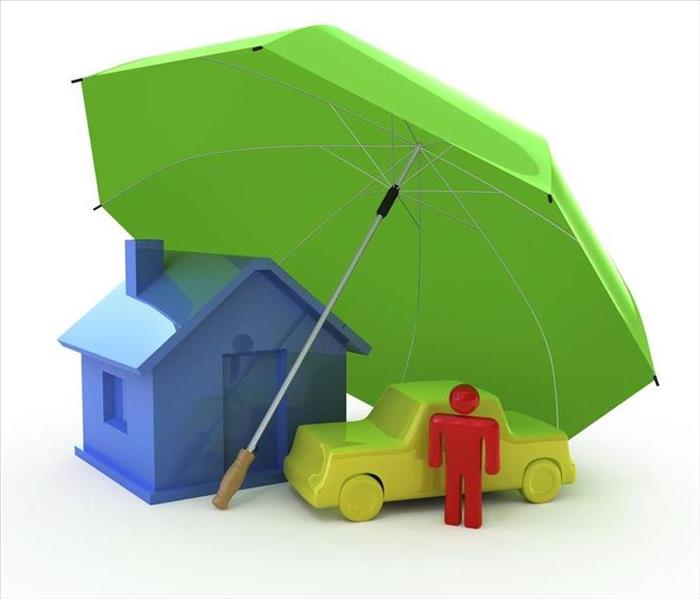 Insurance loopholes you need to protect yourself against.
Insurance loopholes you need to protect yourself against.
SERVPRO® of Spencer and Iowa Great Lakes, a local cleanup and restoration company, along with Community Insurance will be providing a free lunch and learn for realtors, property managers as well as the general public. This educational program will take place at the Holiday Inn & Suites in Spencer on Thursday, June 14 from 12:00 – 1:00 PM and a light lunch will be provided.
The session will cover the different types of insurance homeowners should be adding to their homeowner’s policy in the case of ground-water, water back-up, sump pump failure and/or sewer backup entering their basement.
“There is a million ways water can get into your home, but what homeowners don’t always understand is what type of coverage they need in each case. Many times, SERVPRO professionals visit a home with water damage and the homeowner is upset when their policy does not cover the water damage,” shared Lathe Toft, owner of SERVPRO of Spencer and Iowa Great Lakes.
Scott Simpson, President of Community Insurance continued, “We are delighted that SERVPRO called our team to help educate home and business owners understand their policies better. It’s our goal to help policyholders take a deeper look at their policies before they have a major damage occur. Not knowing what’s in your policy can have serious financial consequences.”
Class size is limited, so SERVPRO is asking those interested to RSVP by calling their office at (712) 262-4379 or email vmoore@SERVPROspencer.com.
Tune up your sump pump before the spring thaw
3/6/2018 (Permalink)
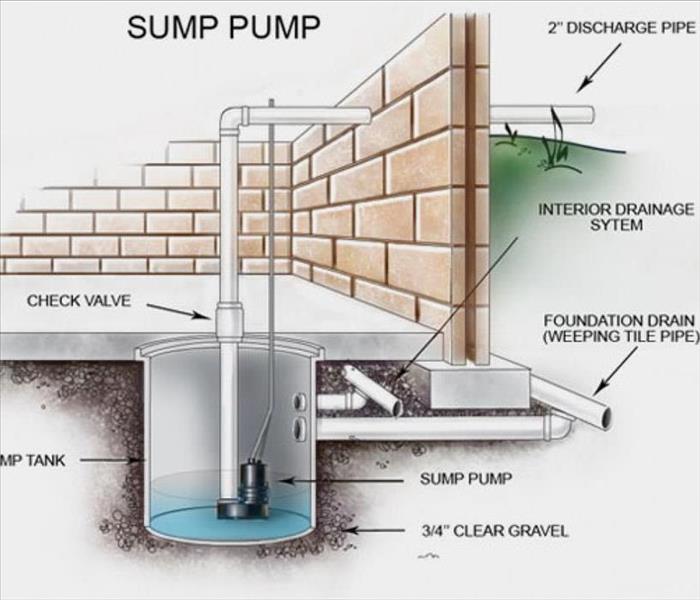 Get in the habit of regularly taking on a few maintenance steps to make sure your pump is functioning properly.
Get in the habit of regularly taking on a few maintenance steps to make sure your pump is functioning properly.
Mother nature keeps teasing us that spring is on its way. As we get excited for spring flowers, sunny days and the return of cheerful chirping birds, we must remember one important word. THAW.
As the days begin to warm up and the threat of snowfall turns to spring showers our homes face a new source of stress from snowmelt, heavy precipitation, groundwater and even flooding. So, it’s a great relief to know we have a heavy hitter in our corner. That’s where your sump pump comes in.
The additional ground water flows into a shallow pit called a basin by a network of tubes and drain systems. Once that basin fills to a certain level your pump is triggered by a float. The sump pump then pushes the water out and away from your home through a discharge pipe.
All this happens IF your sump pump is functioning properly. So, how do you make sure that it remains functional? Get in the habit of regularly taking on a few maintenance steps.
Check the Power Source
Is the pump properly plugged into to the electrical system? Is there a battery back-up in case of losing power? Is the cord in good shape?
Make sure the pump is in place
Check to make sure the pump is level and the float is positioned correctly.
Clean the sump pump and surrounding area
Lots of sand and gravel can enter your basin through the flowing water. It is best to check frequently for sediment at the bottle of the basin and to run clean water through your pump to make sure none of that debris becomes lodged in the pump system.
Test your pump regularly
As recommended above, run clean water through your pump regularly to make sure it is running correctly as the basin fills.
Look for leaks
Check pipes, connections and valves for any leakages.
Have a professional service your system yearly
We recommend that you have a professional inspect your sump pump year, preferably before snowmelt, rainfall and other spring hazards. A professional should dismount your pump, flush the pump, test the electrical and backup systems and repair any leaky connections and fine tune your pump’s motor.
If you have any other questions drop us a line day or night through our Contact Us page. Our team is always ready to share our knowledge and passion with others!
It's the Moisture You Can't See That Matters Most.
1/15/2018 (Permalink)
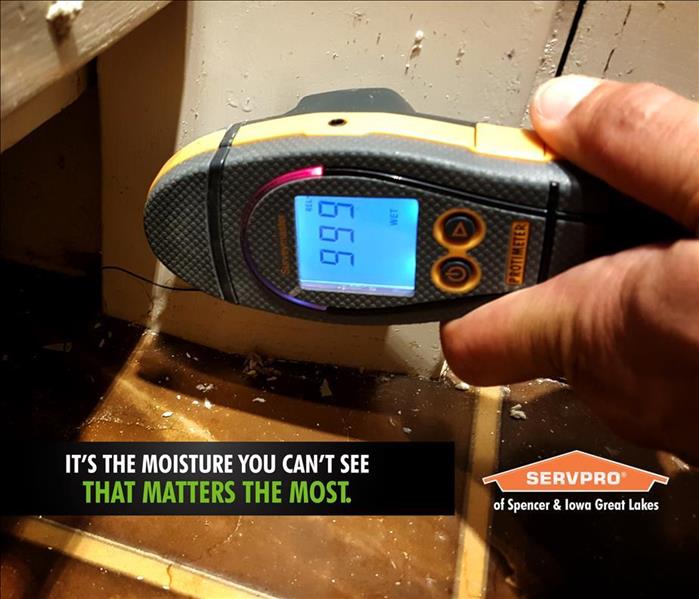 Notice the high number, along with the red swish lit up around the display,verifying that this trim is completely saturated.
Notice the high number, along with the red swish lit up around the display,verifying that this trim is completely saturated.
Before we begin any water damage restoration job whether ins Storm Lake, Spencer Algona or Southern Minnesota, Chris our Project Manager assesses and documents where the water damage has occurred.
He relies on a Surveymaster Protimeter moisture meter during his inspection. This important piece of equipment allows Chris to assess the moisture levels and diagnose moisture-related problems.
Excessive moisture in buildings can lead
to decay and deterioration of components and
decorative finishes.
The Surveymaster using two operational modes:
Search and measure. These
functions help Chris to distinguish
sub-surface from surface moisture, essential
information when trying to establish the
extent and cause of a dampness problem.
Chris then works with our team of SERVPRO technicians to:
- Identify the extent of the moisture penetration
- Diagnose the cause of the problem
- Monitor change in the moisture level
Have Water or Flood Damage?
Call Us Today – (712) 262-4379
We’re Highly Trained Water Damage Specialists
We specialize in water damage restoration, the cornerstone of our business. We have extensive water damage restoration training, and our process emphasizes regular monitoring and documentation of the drying process from beginning to end.
Learn More
It's not a fan, it's an air mover!
1/11/2018 (Permalink)
 No fancy fan here, but an essential tool that can save you thousands.
No fancy fan here, but an essential tool that can save you thousands.
If water has made its way into your home, whether in Spencer, Storm Lake, or southern Minnesota, SERVPRO of Spencer & Iowa Great Lakes is here to help.
Our team of Restoration Technicians are trained using IICRC standards to make it “Like it never even happened.” using specialized techniques and industrial equipment designed to mitigate damage and prepare the property for reconstruction. Our warehouses and trucks are stocked with equipment that will extract standing water and then, based on environmental conditions, dry the property to prepare it for reconstruction. The most common equipment you’ll see installed are industrial dehumidifiers, air scrubbers, and air movers.
Air movers? When I told my husband about the equipment we use at my new job, he said, "isn't that just a fancy fan?" Funny guy.
An air mover is much more than a fan, it’s an essential tool for mitigating water damage. This devise creates high-velocity airflow, allowing an environment to dry as quickly and efficiently as possible. Combined with dehumidifiers, it’s a powerful combination that restores the environment to original conditions and is a necessary tool for water restoration.
Advantages of air movers include:
- Energy Efficient: Air movers use minimal power for maximum air flow.
- High velocity: Air movers work great for ventilation and cooling.
- Speeds drying time: Air movers help floors, carpets and wall cavities dry faster.
When the drying process time is reduced so are the chances of a second loss or additional damage, which can include microbial growth.
No fancy fan here, but an essential tool that can save you thousands.
Like it never even happened.®
11/6/2017 (Permalink)
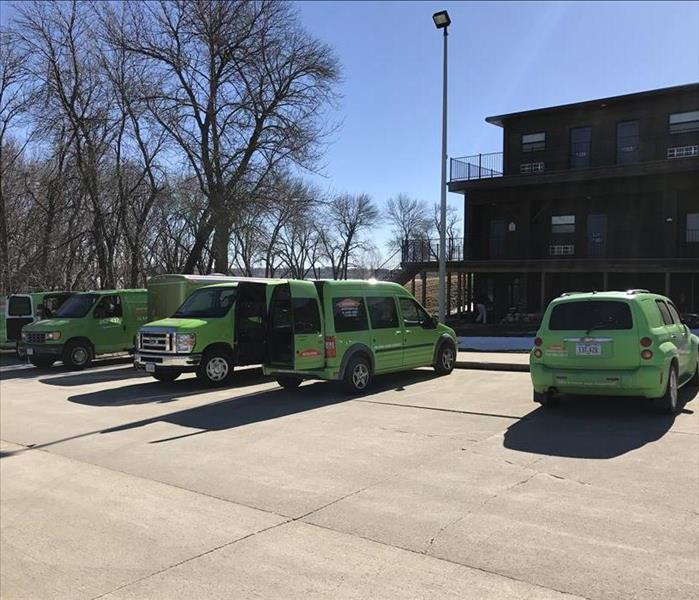 Quick to respond, SERVPRO of Spencer and Iowa Great Lakes was able to save The Okoboji Commons Hotel.
Quick to respond, SERVPRO of Spencer and Iowa Great Lakes was able to save The Okoboji Commons Hotel.
Earlier this year The Okoboji Commons Hotel suffered a devastating water-loss when a main water break occurred.
The hotel was getting ready to close for the season when water infiltrated their lower laundry area and their executive suite. Okoboji Commons Hotel Co-Owner Kristi Leigh acted quickly and called SERVPRO of Spencer and Iowa Great Lakes.
The crew at SERVPRO worked quickly to assess the damage and quickly dry the area. It was determined at that time that some portions of the ceiling and much of the drywall near the floor was affected by the water and would need to be removed and replaced.
To quickly dry the area, the team used a multi-disciplined approach. For the hard surface and carpeted flooring the crew used professional-grade dehumidifiers and water extraction units. They also placed air movers to help dry the area and move the humidity outdoors. Also important to the drying process was applying SERVPRO's exclusive plant-based anti-microbial agent.
By working quickly to extract and move the water the crew was able to avoid mold growth and further damage to the over 14,000 square feet of the hotel which was affected. Reconstruction happened quickly and the crew was able to stay on time to meet the hotel's deadlines to make sure that they were ready for business prior to their opening season.
View Before and After Photos >>
Spencer and Iowa Great Lakes 24-Hour Emergency Water Damage Service
10/12/2017 (Permalink)
 SERVPRO of Spencer and Iowa Great Lakes provides 24 hour fire and water damage restoration service in northwest Iowa.
SERVPRO of Spencer and Iowa Great Lakes provides 24 hour fire and water damage restoration service in northwest Iowa.
SERVPRO of Spencer and Iowa Great Lakes is available 24 hours a day for water emergencies, large or small. When you are dealing with water damage, immediate action is crucial. A delay of just a few hours can greatly increase the severity of the water damage.
We Answer the Phone Ready to Help
Call Today - 712-262-4379
We understand that when you call us, you may be feeling confused, stressed, and vulnerable. You need an expert to guide you through this crisis. SERVPRO of Spencer and Iowa Great Lakes has the specific water damage training and experience to help you through this tough time. We specialize in water damage restoration—in fact, it's the cornerstone of our business.
What to Expect
When you call, we will ask several questions regarding your water damage emergency. These questions will help us determine what equipment and resources to bring, including how many trained SERVPRO Professionals may be needed.
Our SERVPRO Representative will ask several questions:
- Your name and contact information
- Your insurance information (if applicable)
- The street address of the water-damaged home or business
- When did the flooding or water damage occur?
- What caused the water damage (if known)?
- Is there electricity available (on-site)?
About SERVPRO of Spencer and Iowa Great Lakes
SERVPRO of Spencer and Iowa Great Lakes specializes in the cleanup and restoration of residential and commercial property after a fire, smoke or water damage event. Our staff is highly trained in property damage restoration. From initial and ongoing training at SERVPRO’s corporate training facility to regular IICRC-industry certification, rest assured our staff is equipped with the knowledge to restore your property.
5 Things to Do If You Find Water in Your Home.
10/12/2017 (Permalink)
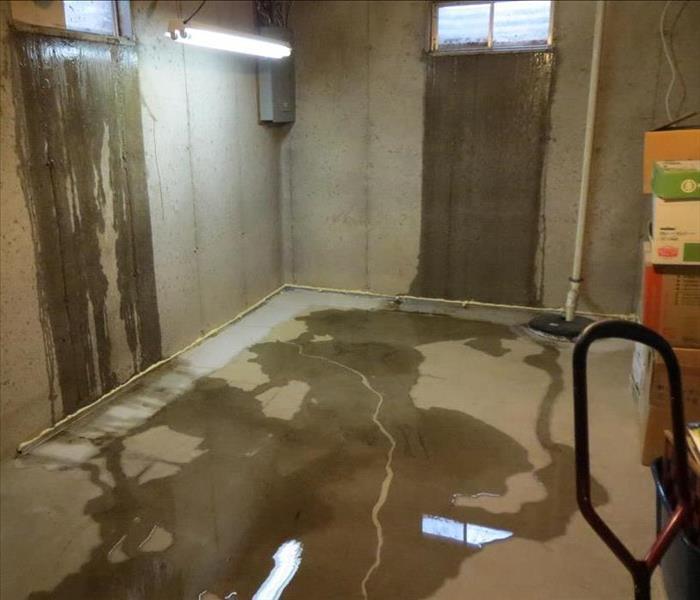 Water damage can happen at anytime.
Water damage can happen at anytime.
This week we have been inundated with calls from desperate homeowners with water losses.
With the amount of rain we received recently in northwest Iowa, we thought it was a good time to go over what you should do if water enters your home.
Water damage can cause all sorts of a headache for homeowners, both immediately after the damage occurs and in the long run. From floods to leaky faucets, water damage is a serious pain and can cause significant health and safety issues.
Follow these 5 steps to keep water damage from getting worse.
- Take Pictures. Before you remove any water or make any repairs, fully document the damage for your insurer by taking photos or video.
- Protect Your Health. Even if the water in your home is clear, it could be contaminated by sewage or household chemicals. Even chemicals on walls or in insulation can contaminate water. Make sure to wear wader ad rubber gloves if you opt to remove any water-damaged possessions to avoid contaminants.
- Call Your Insurance Company. You should notify your insurer soon as possible after water enters your home. Advise your insurance representative of the state of your home and any repairs you intend to do immediately. Be sure to follow the insurance company’s direction about whether or not to wait for an adjuster to inspect the property before making repairs.
- Remove the Water. Once your insurer approved, remove the water, use a sump pump or wet vac, open doors and windows to allow fresh air to circulate.
- Mitigate Mold Damage. We recommend you call our experts at SERVPRO of Spencer and Iowa Great Lakes. Mold can develop in as little as 24 hours. Our crews will remove carpeting, padding, bedding and help you determine what is salvageable and what is not. Our team will also control mold growth by cleaning with special mildewcides.
Need Emergency Service? Call Us 24/7 – (712) 262-4379
Learn more about our Water Damage Repair and Restoration services.
 SERVPRO of Spencer & Iowa Great Lakes can make your water damage emergency "Like it never even happened." 712-262-4379
SERVPRO of Spencer & Iowa Great Lakes can make your water damage emergency "Like it never even happened." 712-262-4379






 24/7 Emergency Service
24/7 Emergency Service



























